#again this is all from a narrative perspective not a character perspective I want to make that clear because I see gay mutuals being lit up
Text
Well, again, the issue is not that Rhys has done bad things, it’s how those actions are framed in the story. Let’s think about this – if Rhysand’s actions UTM were framed as negative then perhaps we would not be having this conversation.
Of course, we can argue that Rhysand (1) has developed negative coping mechanisms / perspective (2) Rhysand’s trauma informs the things that he does (both pre, during, and after UTM), and (3) Rhysand’s position was uniquely isolating because of the nature of the role he was forced to play. These are points that I believe can be argued and offer an interesting view; but for any of that to happen, we have to acknowledge that the behaviors are negative. That’s often the problem with the arguments that begin to arise – no one wants to admit that Rhysand has developed (or just has) negative qualities and behaviors. No one wants to contend with the reality of consequences. “Rhysand has always admitted that he would be willing to do terrible things for his family” – and yet there’s no elaboration on those “terrible things.” No one wants to talk about those proposed negative qualities. The story (and the audience) don’t want to admit that Rhys doesn’t really have a solid moral high ground over Tamlin, or admittedly other villains. Just because Rhysand “admits” he’s prone to basically being abusive doesn’t…make it any less abusive.
My proposed argument about Rhysand’s actions UTM are this: he chose to sexually assault Feyre, he chose to “protect” Feyre in ways that were extremely sexually explicit. I believe these are choices that Rhys chooses to make – and I believe they say something about him. It’s noted, to me, that Amarantha scarcely makes Rhys do anything that he does to Feyre. I also believe that his actions regarding Feyre were done with an air of autonomy; as in, I believe Rhysand takes these measures into his own hands. Ultimately, I believe that while Rhysand has to contend with the horrors, he himself becomes beholden to them at some point and ends up perpetrating the same behaviors.
We cannot argue that Rhysand sexually assaulted Feyre, and then argue that it doesn’t say something about him. It does. In the realm of the story – from a writing standpoint – I think a good author can still make a character like that sympathetic and understandable (see: Nahadoth and Itempas from N.K. Jemisin’s Hundred Thousand Kingdom). If I were analyzing Rhysand’s actions, I would simply make the argument that perhaps Rhysand’s abuse of Feyre mirror’s his own abuse by Amarantha hands, and he potentially sees Feyre (and her hope) as something to be threatened – or even shamed by. If Rhysand’s actions were written in a way that clearly exemplified that his actions are not meant to be praised (and are NOT are reflection of love) then he could be salvaged. I actually believe a lot of the abusive things Rhysand does makes sense given the environment and if the story leaned into this from a storytelling perspective and did away with needing to moralize, then this would all be fine. Framing Rhysand’s abuse of Feyre as something to be praised, admired, and loved for is actually quite insane. If we frame his actions as purely preservational and self-serving, that would make so much sense. Imagine being in Rhysand’s position; I guarantee everyone would do whatever they could to stop such extreme amounts of abuse and sexual violence. And even then, the story could still create a narrative that warns of the danger of sexual violence and consent, it would just be subtextual and more allegorical than concretely written in the text. Starting Feyre and Rhysand off in such a tragic place, having Feyre and Rhysand acknowledged truly what happened, having them discuss ways for both of them to move forward while building up the mating bond in the background. Have Feyre acknowledge this untrusting, sly, slick part of Rhysand and have her not assume her mate does everything out of the kindness of his heart. Build their romance out of a place of mutual atonement – play on the theme of guilt Feyre feels and the whole premise of the court. Let the connection between Feyre and Rhys be that they truly acknowledge each others darkness (and also let Feyre do selfish things – maybe she knew damn well Clare Beddor’s family might suffer a bad fate but its not her family and Feyre would do anything for them; Let Feyre kill those fairies with ease because she cares about her life. Let her contend with reality that she would actually do anything for her family and then have that be a connection between Rhys and Feyre.
Something that has always bothered me about the “we don’t talk enough about Rhysand’s trauma” argument that gets thrown around when we earnestly discuss the validity of his actions is the presumption of innocence in that statement. The unwritten statement is that the trauma somehow explains and simultaneously absolves him of the implications of his actions. I objectively agree with the sentiment – Rhysand’s trauma is not talked about enough and it should be. The argument dancing in the corner is the fact that people believe that Rhysand’s extreme amount of trauma absolves him – even going as far as essentially say that Rhysand’s abuse operates out of fear (or because of fear) which is essentially the exact same ideology the book bashed Tamlin for. In the end, the cycle just comes back around and the abuse gets pushed into the backdrop.
#anti sjm#anti rhysand#anti feysand#anti feyre#anti acosf#anti acomaf#this is more of an analysis of character than anti character rant#I’m just tired of people trying to essentially disregard that rhysand has done bad things#while simultaneously trying to make justification for it
78 notes
·
View notes
Note
I’m the anon from the post before and I understand what you mean! I guess I just took differently when I watched the show. I don’t think Charlie or Nick was upset about Ben being closeted I think they (especially Charlie) we’re just upset how Ben treated Charlie the entire. Also I’m not saying this to be rude or start anything this is just how I saw it:) I think Charlie was angry (as he should) about how Ben treated him through out the relationship they had and not about him being closeted. Because I do believe if Ben just communicated better and treated him better and didn’t treat Charlie the way he did it could’ve worked out. I’m just saying that I didn’t see them bashing Ben for being closeted only bashing him for treating Charlie the way he did without acknowledging how it felt for him.
Yeah I don't think Charlie or Nick is mad about Ben being closeted but weirdly I think the narrative is and that's what irks me. All his issues and bad behaviors are because he's closeted (you said yourself that it's because he's closeted that he treats Charlie the way he does) but the story doesn't seem interested in exploring that so much as punishing him for it by having both Imogen and Charlie yell at him and then throwing him out of the series before he can improve at all.
And when this show is so renowned for it's love and celebration of queer experiences and identity it will always feel out of place that Ben was left out in the dust seemingly because he and his experiences were too complex.
#ben hope#heartstopper#sorry if you really like the show but I am absolutely not the only one that found the handling of Ben uncomfortable#especially when the character is so so young literally the same age as Nick#to deny him the chance to grow feels wrong to me and a lot of other gay men who didn't have our shit together by 16#like this kid hasn't even taken his GSCE's which I assume are similar to the SATs or the Baccalauréat!#he needs to be given the opportunity to grow and he essentially gets the door shut in his face when he's trying to apologize#and to add to it Charlie gets that 'ambush me into accepting your apology' line that once again frames his own growth as a manipulation#which is FUCKED UP!#and from a writing perspective portrays the hand of the author pointing and screaming Hate This Boy Hate Him Hate Him#and the hand of the author should not be that obvious#it makes it feel disingenuous and as if Ben is just a stand in for someone who treated the author poorly#again this is all from a narrative perspective not a character perspective I want to make that clear because I see gay mutuals being lit up#by people who think Charlie should have been forced to forgive Ben or something#but thats not at all the argument any of us are making here
32 notes
·
View notes
Text
wtf is dracula daily?
i’ve seen a couple people ask this question on my posts about it, so i thought i’d go ahead and clear it up here!
ok so, the classic horror novel “dracula” is an epistolary novel - that means it’s told via letters, diary entries, ship logs, and news articles. (technically the term “epistolary novel” refers to works told solely through letters or emails, but many have expanded it to mean any work that is told via in-universe documents, hence why diaries and logs often get included as well. “frankenstein” is another classic example; the whole framing device is robert walton is recounting the story he heard from victor to his sister via letter. a modern example would be “several people are typing,” which is told via slack messages, or “the perks of being a wallflower,” which is told via letters from charlie to his anonymous pen pal, which is functionally more like you’re reading his diary.)
because of the nature of the narrative, we actually know the exact day nearly everything in dracula happens - the letters, news articles, diary entries, etc. are all dated.
“dracula daily” is a substack project where the novel is broken up into parts, with people who are subscribed to the project getting emails every day something in dracula happens - for example, the novel opens with jonathan harker’s journal entry on may 3, so on may 3, subscribers are emailed that entry. the action of dracula takes place from may 3 - november 6, plus an epilogue set some years later. the project started in 2021 (i think), but fucking BLEW UP in 2022, and they’re doing it again this year! lots of us are very excited - especially people like me who fell behind last time.
why not just read the book?
valid! due to some parts of dracula being told out of chronological order, dracula daily does reorder some things. for example, the first section of dracula is told entirely from jonathan harker’s pov, then the second section switches the pov to mina murray. their sections have some overlap in the timeline, so dracula daily jumps back and forth between their perspectives.
if you want to read the book as bram stoker intended, dracula daily may not be for you. but for a lot of people (myself included!), it breaks up a very long text into easily digestible chunks (....mostly. there is one entry that is 10k words), and the fact that it’s a big project means there are a lot of people reading along with you.
i think there’s also something valuable about experience the slow revelation of wtf is going on along with the characters. the book which you might otherwise get through in a few days is stretched out into months of suspense and agony as you wait for the other shoe to drop, and it’s great.
plus, the whiplash between “jonathan harker’s neverending horror” vs “lucy is basically on the bachelorette” that you get in dracula daily is very very funny.
how do i sign up?
right here! and if you sign up and fall behind in the emails, no worries - the dracula daily website posts past entries so you can catch up.
what if i prefer audiobooks?
have i got great news for you!
like i mentioned before, i couldn’t keep up with the emails last year. part of it is that it is much easier for me to focus on an audiobook or keep up with a podcast than it is for me to sit down and read, especially with longer entries.
this year, there is going to be a podcast titled “re: dracula” that was inspired by dracula daily. every episode will be a dracula daily entry, with a full voice cast! (seriously, if you listen to british podcasts, you will recognize some of these names. the magnus archives and wooden overcoats girlies are WINNING.) you can find that here.
there is also a podcast called “cryptic canticles” that has an already-completed audiodrama of dracula that i’m told is also extremely good, and was also broken up by date. you can find that here.
why do i keep hearing about paprika/the boyfriend squad/lizard fashion/cowboys?
you’ll see.
oh god am i gonna hear about this nerd shit for the rest of the year
yes. sorry.
3K notes
·
View notes
Text
Miguel is Fine, Actually (Being Spider-Man's Just Toxic As Hell)
Before I watched ATSV I said that I would defend my man Miguel O'Hara's actions no matter what, because he's always valid and I support women's wrongs. I was joking, and I did not actually expect to start defending him on Tumblr.edu. But I'm seeing a lot of commentary that's super reductive, so I do want to bring up another perspective on his character.
Miguel wasn't acting against the spirit of Spider-Man, or what being Spider-Man means. Miguel isn't meant to represent the antithesis of Spider-Man. Miles is the antithesis of Spider-Man. Miguel represents Spider-Man taken to its extreme.
Think about Miguel's actions from his perspective. If you were a hero who genuinely, legitimately, 100%, no doubt about it, believed that somebody is going to make a selfish decision that will destroy an entire universe and put the entire multiverse at severe risk - if you had an over-burdened sense of responsibility and believed in doing the right thing no matter what - you would also chase down the kid and put him in baby jail to try and prevent it. He believed that he was saving the multiverse, and that Miles was putting it in danger for selfish reasons. Which is completely unforgivable to him, because selfishness is what he hates the most. And then he goes completely out of pocket and starts beefing with a 15yo lmfaooo he's such a dick.
But why did Miguel believe that? Why did he believe that Miles choosing himself and his own happiness over the well-being of others was the worst possible thing? Why did he believe that tragedy was inevitable in their lives, and that without tragedy Spider-Man can't exist?
Because he's Spider-Man.
Peter Parker was once a fifteen year old who chose his own happiness over protecting others. It was the greatest regret of his life and he never forgave himself. Peter's ethos means that he will put himself last every time, and that he will sacrifice anything and everything in his life - his relationships, his health, his future - to protecting and helping others. Peter dropped out of college because it interfered with Spider-Man. He destroyed his own future for Spider-Man. He ruins friendships and romantic relationships because Spider-Man was more important. If Peter ever tries to protect himself and his own happiness, then he's a bad person.
That is intrinsic to Peter. Peter would not be Peter without it. A story that is not defined by Peter's unhappiness is not a Spider-Man story. If Peter doesn't make himself miserable, then he's just not Peter.
That is a Spider-Man story: that not only is tragedy inevitable, that if you don't allow yourself to be defined by your tragedy then you're a bad person. If you don't suffer, then you're a bad person. If you ever put anything above Spider-Man, then you're killing Uncle Ben all over again. Miguel isn't the only one that believes this - as we saw, every Spider-Man buys into what he's saying. There's no Spider-Man without these beliefs.
Miguel attempted to find his own happiness, and he was punished in the most extreme way. He got Uncle Ben'd x10000. He tried to be happy, and it literally destroyed his entire universe. It's the Spider-narrative taken to the extreme. Of course Miguel believes all of this. Of course he believes this so firmly. He's Spider-Man. That's his story. And the one time Miguel tried to fight against that story, he was punished. And like any Spider-Man, he'll slavishly obey that narrative no matter the evil it creates and perpetuates. Because if he doesn't, the narrative will punish him. The narrative will always punish him. It's a Spider-Man story.
I don't think the universal constant between Spider-Mans, the thing that makes them Spider-Man, is tragedy. I think it's the fact that they never forgive themselves. And Miguel is what that viewpoint creates. He doesn't believe this things because he's an awful, mean person. He believes them because he's a hero. He's a good person who hates himself.
Across the Spider-verse isn't really a Spider-Man story. It's a story about Spider-Man stories. Miguel's right: if this was a Spider-Man story, then Miles acting selfishly really would destroy the universe. But Miles' story isn't interested in punishing him. It pushes back against Peter's narrative that unhappiness is inevitable and that you have to suffer to be a good person. It says that sometimes we do the right thing from love and not fear, and that Peter's way of thinking is ultimately super toxic and unhappy. ITSV was about Miles deciding that he didn't need to be Peter Parker, that all he needed to be was Miles, and ATSV is about how being Peter Parker isn't such a good thing. Miguel shows that. Whatever toxic and unhealthy beliefs he holds - they're the exact same beliefs that any Spider-Man holds. He's a dick, but I don't think he's any more awful a person than Peter is.
TL;DR: Miguel isn't a bad person, he just has Spider-Man brainrot.
#across the spider-verse#atsv#atsv spoilers#across the spider-verse spoilers#across the spiderverse#across the spider verse#miguel o'hara#atsv meta#source: i recognized an embarassing amount of those cameos#im also seeing a lot of ppl make a lot of assumptions about what miguel was injecting and why#we dunno guys! im not gonna suppose anything#I just think that Miguel and Miles are great foils#and that what makes them interesting as foils#is the fact that they're both good people who want to do the right thing#miguel shows how that gets twisted#to the point where you beef with a 15yo sometimes which is still so funny#im a big spidey 2099 fan#which I love bc it is NOTHING like spiderman and yet it's such a good spiderman story#but talking about comics migs is useless bc he has 0 in common with atsv migs#but there is a lot of VERY cool stuff to say about how#the sm2099 comic has nothing to do with spiderman at all whatsoever extremely pointedly#but its still a wonderful spiderman story that finds its own way#tbh it was kind of a breath of fresh air to read a spider-man story that wasn't about spider-man for once#and that was just about miguel#anyway stan women's wrongs#miguel o hara#miguel ohara#my writing
3K notes
·
View notes
Text
Izzy Discourse Masterpost
Hey all, given the amount of awful splintering and wank happening in ofmd fandom rn regarding Izzy's death, including the flat-out immature and unacceptable harassment of David Jenkins and Co, I wanted to just make this one all-encompassing post to address the various grievances and complaints I've seen (almost entirely on Twitter). If I've missed anything, please feel free to add on. I'm putting most of this under a read-more for length.
Please be aware, I say all of this as an Izzy fan. I've loved his character since season 1, and while I was sad to see him go, I completely understand and support David & Co's reasons for concluding his arc, and I think it was done respectfully in a way fitting to his character. So let's break down some of the takes I've seen. I am not referencing specific posts or people here, I just want to address the general themes that I keep seeing about why some people are upset.
Izzy's death served no narrative purpose.
Look, this is one that I'm sure fans will debate for the rest of the hiatus. It's completely within your right to disagree with this writing choice, but Izzy's death did serve a narrative purpose in the story that David Jenkins is telling - and he has spoken to this end in several interviews already. I can only summarize here, and fans may find other perspectives in time as well. What we need to remember is that Our Flag Means Death is, at the end of the day, Ed and Stede's love story. That has been made abundantly, explicitly clear. The show has been fantastic at fleshing out the other supporting characters, but that's what they are - supporting characters. They often have their own subplots but ultimately the narrative seeks to move Ed and Stede's story forward and they are tools to spur Ed and Stede's growth or mirror their struggles. Izzy has been a wonderfully complex, multifaceted character but we must remember that all characters are vessels through which stories are told, lessons are imparted, and metaphors are established. He's not a real person who 'deserves' any particular fate. David said he's always intended for Izzy to die at the end of his arc.
Firstly, Izzy (now canonically, through his own dying words) represents part of Blackbeard. He enabled and encouraged Ed's darker side, they were mutually toxic forces to each other. Ed is attempting to cope with and move on from this phase of his life, and like Stede in season 1, set out a free man, unshackled by expectations and loose ends of those he's hurt and been hurt by (though we realize this is an ongoing process that takes time). This lovely gifset sums it up nicely, with Izzy being the Mary parallel, and making s2 mirror s1. Blackbeard is both Ed and Izzy; Ed cannot be free of Blackbeard while Izzy is in his life, and when Izzy is gone he will never truly be Blackbeard again. They are each other's rotting leg!! Yet, they love each other - and David has said that for Ed, this has developed into a mentor and father relationship, and where Ed has previously despised his father figures (his actual father, Hornigold) he does not want to lose Izzy. This time, Izzy brings out Ed, not Blackbeard - and that's where we get the callback to 'there he is', bringing their impact on each other full circle, freeing Ed, getting approval of sorts that he never had, to be soft, to be loved (and there are parallels to Zheng and Auntie here as well that others have made) from that force that drove him to stay in line all this time. David has said in multiple interviews now that he was going for the idea of the mentor/father figure dying and the hero living on and trying to do justice to them.
From Izzy's side, Izzy cannot be free while Edward remains either (Mary cannot find peace while Stede remains). The scar never truly healed, the leg will always be a reminder. At this point the argument becomes 'yes, but why did he have to die? Why not just sail off with the crew of the Revenge?' David has stated that he feels they've done everything they can with, and for, Izzy; he's come leagues from season 1, he's found community, he's found hope, he's found new parts of himself, and he's made good memories. He's found worth outside of what he can be to others. That's more than most pirates could hope for. Where would his character go from there, when the Golden Age of Piracy he belongs to has burned to the ground? Would he stay around and whittle on the Revenge? If he were a real person, yes, that would be lovely, and he'd deserve all the quiet peaceful happiness in the world. But as I explain several points below, he's not interested in being a captain. He's not up for the hard physical labor of regular crew, and he's extremely overqualified for that besides. He has served his narrative purpose, and symbolically, to enter a new age, everything must go. He's connected to the old age of piracy, to the Republic of Pirates, that is now demolished. To him, fighting for what he believes in, for the family he's found, bringing down an army of British twats in the process, is how he should go. It's a pirate's death, and as Izzy's said, he's a pirate - unlike Blackbeard who's succeeding in breaking away from piracy, Izzy never wanted to stop being a pirate, throughout his arc. To me, that's why Izzy remains trapped in the narrative, trapped in history, whereas Ed and Stede will escape history. They leave piracy, and canon, behind, while Izzy was content to remain a pirate and face a pirate's fate.
Burying him on land, right next to Ed and Stede's beach house, shows that his sacrifice was not in vain - they start this new life together, thanks to Izzy's mentorship, his role in their lives that sometimes for worse, sometimes for better, made their love what it was and made their breakaway possible. The new age is built on the foundations of the old age, and is stronger for it.
As we're well aware by now, David tweeted that there's no version of ofmd without Izzy. Whether that's literal or not, symbolically it's true. Izzy's arc of growth affected everyone on the Revenge. Jim fondly remembered fighting for a time when life meant something on that ship; the crew helped give Izzy new meaning in life, and he helped them in return. When he dies, they mourn and have a funeral; that wouldn't have happened under Blackbeard's watch in episode 2. His life meant something to them. He influenced Ed and Stede immensely, and they will take that with them. As David's said, they're all a family, and Izzy was a part of that family, and his loss unites them and brings them closer to continue to fight for that family they've built. It's a tragic, sudden death of someone they've all grown to care for, and that steels their reserve to keep the torch lit. They literally sail off into the sunset to hunt down Ricky to avenge Izzy; he will always be a part of this show. And, of course, with the brief appearance of seagull Buttons, the door is left open for anything.
If this was The Izzy Show, then sure, we'd be content to see him simply engaged in shenanigans every episode. But the plot, and therefore the characters, need to keep moving forward, and Izzy got his growth and development. He got what he needed for his character to have closure, and he served his symbolic narrative purpose in Ed's (and Stede's) story. You may have your own ideas and perspectives, and that's great - that's what fandom is for. But we cannot say his death was pointless when David Jenkins and the writers clearly had a well-defined motive for pushing the narrative in this direction. I actually think the narrative around Ed and Izzy is the most well-developed in the entire show. I for one am so happy we got such an interesting and complex character, and had the brilliant Con O'Neill to portray him.
Izzy's growth & healing arc was rendered pointless by his death.
As this post so eloquently puts it, it's pretty bleak to have the outlook that taking steps to heal and find meaning in life is worthless if it's later lost. Seeking happiness and self-actualization is worthwhile for its own sake; no one knows what's down the road, and we all die eventually. Find meaning in life now. Would you rather have had Izzy not miss with his bullet in ep2? He was given the chance to experience joy, freedom, and hope for the first time in potentially a long time, and when he died he did so with those happy memories. As mentioned, Izzy's death was decided long beforehand given the narrative, and the point of storytelling is to make you feel emotions. We were given impetus to connect and relate to Izzy's character through his process of healing, so when he did die, we felt it keenly. That's how stories work actually! We felt what Ed felt. It moved us. It's not a bad thing that Izzy's arc made him more likeable to fans before his death. It's not a bad thing to lose a beloved character - guess what, it happens constantly in stories - and it's not bad to grieve over it either, but to say that it made his journey pointless is just not true. People saying that Con must be upset that they snatched his character away from him after getting to develop him so much - again I say, would you rather him have died in ep 2 before he had the chance to grow? Or how about in s1, when the crew tried to mutiny? How'd you feel when Stede killed him in his dream, in the very first scene of the season? I think Con's probably glad for the opportunity to have explored this character so much in season 2. Ask him if he thinks it was pointless.
Killing off Izzy was bad for queer rep/burying your gays/"Izzy was the queer heart of the show"
I'm putting 'bury your gays' on the top shelf so people can't use it when it doesn't actually apply. Most of the main cast of characters in this show are queer, and it's a show about pirates with a good amount of violence. Ergo, chances are a queer character will die in the course of Things Happening In Stories. Izzy didn't die because he was queer, and he wasn't the token queer rep. Please turn your attention to the boatloads (literally) of queer characters that are happy and thriving (how about the LuPete wedding immediately afterwards??). As for Izzy being the "queer heart of the show," this is literally the Ed and Stede show. You know, the two queer leads whose queer love the show revolves around, per David Jenkins himself. I'm glad folks connected with and derived joy from Izzy's growth and especially his performance in Calypso's birthday, but he is not the main character of the show. The queer heart of the show is in fact, the entire show, all of their characters and the community & found family they create aboard the Revenge. Not to mention the fan community as well. Izzy was never carrying the show's representation on his back, and frankly that's an absurdly wild take to have (esp when he spent most of s1 actively working against the main queer relationships in the show, attempting to maintain the oppressive status quo of pirate society).
It was bad and irresponsible to have a suicidal character die
Are we forgetting the entire first half of the season where Ed, who was suicidal, kept trying to passively kill himself because he felt he was an unlovable monster, only to be shown that he is in fact loved unconditionally and it gives him the strength to fight for life and triumph against his own self-doubt? The show has spent quite a lot of effort telling viewers that despite feeling damaged or broken you are worthy of love and that you are loved even if it may be hard to see it when you're in a bad place. That you don't need to be fully healed to deserve love and care, and that love and support will help you along your journey. It's incredibly wild to disregard this major plot point and fundamental message of s2 to try and spin this the opposite way for Izzy's character.
Secondly, where are people getting 'Izzy is suicidal' from? Are we going back all the way to episode 2, when he's at his lowest point and fails at his suicide attempt, only to be figuratively reborn after removing the metaphorical rotten leg? By the time of the finale he's shown to be in a good place, thanks to the arc of healing and growth he's gotten, through the support of the Revenge crew and his 'breakup' with Blackbeard allowing him to find his own way in life, realizing he doesn't need a purpose to have value and enjoying his time on the Revenge and the bonds he's made with Stede and the crew. He is, in the words of Ivan, "the most open and available I've ever seen him" by the finale. To take episode 2 as evidence he's suicidal is to erase his whole season of growth, which is an ironic thing to do in the context of these arguments. There's no canon evidence Izzy Hands was suicidal post-'Fun and Games'.
As for 'irresponsible,' once again I say, David Jenkins is not your therapist, he's not 'Dad,' and has no responsibility to tell his story any other way than he intended to tell it. Please find media that gives you what you want or need, and if the death of a fictional character causes you this much distress please seek help. I mean this kindly but seriously.
Killing off Izzy was ableist/bad for disability rep.
I point once again to the rest of the characters, several of which are disabled in varied ways. There are literally multiple other amputee characters specifically. It's not good storytelling to wholly avoid killing off any character that is disabled/queer/poc/female or [insert marginalized group here], especially when a) it makes sense narratively, and b) there's plenty of representation of these groups in the media in question. The answer isn't making such characters invincible and immortal, it's increasing the number of these characters in shows so it's not devastating when some do die in the course of natural storytelling.
OFMD was my comfort show/safe space show, now it's ruined for me
I am not trying to be insensitive here when I say that's a problem that is yours and nobody else's. David Jenkins created this show with a three-season vision and a story in mind, and he is telling that story to the best of his ability the way he wants to. It's already been said that he and the crew did not anticipate the fandom becoming as large and passionate as it has. The plot of the show was never intended to be 'fan service,' and it's ironic that there were people complaining this season that there's been too many fanservice tropes, up until David and the rest of the writers room made a narrative decision they did not like, then the complaints changed to not coddling the fans enough.
We as viewers can derive joy from this show, it can be a comfort to us, it can be important to us. But it was not designed specifically for that purpose, therefore it cannot fail in that respect. We do not have the right to harass writers for not steering the ship in the direction we want - it's their work of art, and we can choose to either come along for the ride or not. It's rare to see creators actually given the chance to tell their story the way they intend (budget cuts aside), so let him do that. He should not cater to fans, or cave and change the story to appease us. Respect his right to create his art, and remember you have the right to create your own. That's what fanfiction is for - write fix-its to your heart's content, but keep these realms separate. David Jenkins and Co hold zero, and I mean zero, responsibility to you. He could not please everyone no matter what he did, it would be fruitless to try, and it would certainly compromise the quality of the story he set out to tell.
You are absolutely allowed to dislike choices made in any show. Curate your media experience. If this show no longer brings you joy, stop watching. But it was never David's purpose nor responsibility to juggle the mental health of millions of fans. Trying to put that on him will only make him less enthusiastic about interacting with fans or continuing to make this show. This isn't rocket science. You're responsible for yourself, not this guy you call 'Dad' that you've developed a parasocial-therapist relationship with.
Izzy should have become captain of the Revenge.
Really?? Firstly, we did actually get that already in s1. He was tyrannical and the crew mutinied. But even if you think 'well after his character arc he'd be better suited to it,' it goes against the point of this arc. He's found value in not having a distinct role or purpose on the ship, decoupling his worth from the job he's expected to perform. He's found his place amongst the crew, not commanding it. There's no narrative reason to put him in charge when he's expressed no further interest in slotting himself back into a role full of pressure and expectations.
Con O'Neill was only told halfway through filming, it's cruel to just kill off the character he loves so much.
Guys, he's an actor. More than that, an actor with a theater background. I think he's used to characters dying. You don't need to look out for him. Con and David spoke one on one about it at length so they were on the same page, and David even said that Con took it well. I'm sure Con had input, just as other members of the cast have influenced their characters' stories, costumes, backstories, etc. Do you really think David Jenkins hurt Con's feelings or something? The writers (remember, it's not just David, it's a whole team of hard-working people coming up with these ideas) gave Con such a chance to shine this season, really developing Izzy beyond what he was given in s1 and letting Con show off his full acting range. Why are you only focusing on the destination rather than the journey? Sure, Con's probably sad to see Izzy go, but please do not project your distress onto him or try and accuse David & Co of being 'cruel' to their cast. That's really ridiculous. It's constantly evident how close they all are.
More importantly, do you actually, seriously think that Con O'Neill would want fans to harass each other or the writers over his character? The man who preaches being kind above all? There is no better way to make an actor uncomfortable about a show and its fanbase than to start treating fictional characters like they're more important than real people. He would not want you to bully people over Izzy Hands, and it's mind-boggling that some of you have convinced yourself otherwise.
Lastly, I just want to talk about the fact that some people are holding OFMD to absurdly high expectations.
Our Flag Means Death has been a pioneer series for its diverse representation, earnest storytelling, and themes of hope, community, and love. It's fine to discuss aspects of the show with a critical eye, but so much of the discourse has truly felt like folks are trying to find fault in a show that is leagues ahead of the average tv series that we still enjoy. How many fan favorites are killed off all the time? How many plotlines are scrapped, or drawn out without closure, or contradicted the very next season? How many shows are indifferent or actively hostile towards their fanbase? How many have any queer characters, or actually do bury them? The bar's so low, and OFMD has risen above to give us so much. Some are holding the show to astronomical expectations, waiting for it to fall from the pedestal it's been placed on. If something you don't like happens in the show, it's not suddenly ruined or demoted to being ~just as bad as those other shows~. Give them some breathing room, have some perspective on how progressive the show is, and that perfection is impossible, especially meeting every single viewer's idea of it. This is basically a repeat of the recent Good Omens drama, with an absurd number of people harassing Neil Gaiman for breaking up Aziraphale and Crowley and leaving the second of three acts on a very predictable cliffhanger. Let stories be told, let them unfold as they may, and you are free to leave anytime. It's so wonderful that more queer love stories are becoming popular and even mainstream, but let's not shoot ourselves in the foot by tearing them down when they don't go exactly the way you want it, which often seems to mean no drama, no character deaths, and therefore no conflict or even plot!
Just, please be civil human beings, and while this seems to be a difficult thing for so many fandoms to do, just keep your fan opinions in the fan space. Never bring your grievances to the writers, never bully them and persecute them for telling a story that you opted into viewing. That's something that goes entirely against everything this show, and this cast and crew, have imparted onto us - the importance of kindness, support, community, and love. I'll say it again because it bears repeating: the fate of a fictional character is never more important than how you treat real people. Just be kind in real life, which includes the internet. Thanks.
Now please, let's work together to ensure we get a season 3. There's so much more story to be told, and if you want to see Izzy back, whether that's as flashbacks, as a ghost haunting the inn, or in the gravy basket, we'll need more episodes! #RenewAsACrew
#our flag means death#ofmd#ofmd s2#ofmd s2 spoilers#and after this i will speak of it no more ok#now once we're all calmed down i am really looking forward to meta about izzy's role in the narrative#i truly think izzy's one of the most well written characters on not just this show but on tv lately in general#suicide mention tw#I tried to put a read more under the first bullet point but tumblr's formatting basically deleted it#by automatically overriding it with an Expand#so sorry about the length and such
565 notes
·
View notes
Text
I used to think that the reason I wasn't satisfied with Izzy's death was because I was too attached to his perspective as a character and couldn't focus on the big picture of the season and the main Gentlebeard relationship enough. I mean, I was still convinced that his death and the way it was carried out was a shit writing decision, but everyone else outside the Izzy Canyon circles seemed fine with it, so I was starting to think that maybe they were right.
So I looked back on the rest of the season and rewatched the finale... And realised something that I'd been trying to ignore because it was too painful to admit. A huge part of why Izzy's death hit so hard (in a bad way, not that delicious masochistic pain of having a beloved character die a good, narratively satisfying death) was because throughout this season he was the only character who actually had a satisfying arc and development. Practically no one else did. I didn't actually care for Gentlebeard this season, not the way I cared in S1. From episode 1 to 8 and a half, Izzy's arc was crafted with more care, kindness, subtlety and narrative weight than the main Gentlebeard arc which, in comparison, felt like a string of choppy beads badly tied together in an approximate shape of an arc, but collapsed as soon as you looked at it too closely.
Yes, we all know this season suffered for being 2 episodes too short, but I don't think that's all there is to it. This is starting to feel like GoT season 8 all over again. Would it have been better if it wasn't so rushed? Maybe. Or maybe it would have been even worse because this season just didn't seem to know what to do with itself or the characters. The themes and symbolism are all over the place and completely inconsistent. Ed and Stede's characters are practically back at the same place they left in S1. All they did was bounce off the walls back and forth with no real growth. As soon as they took a step towards fixing their relationship or growing as people, they either tool three steps back or it just got dropped. Stede letting fame get to his head? Interesting and realistic development. And how was it resolved? It wasn't. Stede and Ed being whim prone? I'm glad they brought it up. And then they just fell for another whim and it was presented as a satisfying ending.
Ed went from the Kraken, to taking the first steps towards being Ed, then suddenly all the way to being Ed by way of a Night of Magical Healing Sex that he he didn't actually want to happen because he wasn't ready. And then all of a sudden he pivoted to abandoning Stede and piracy and becoming a fisherman... for 5 min. And then back to Blackbeard again because two fishermen were mean to him for 5 minutes. And then abandoning it again to open an inn. How was any of this even remotely coherent or satisfying? They didn't even have a single conversation about any of it. Ed had more proper closure and communication with Izzy during his dying scene than with Stede and the rest of the crew put together. Izzy's arc got sacrificed to do the heavy lifting for Ed's arc and became nothing more than a shortcut to speed run his character growth. Except it didn't even lead anywhere. "Ed, they're your family, they love you" no they don't, he didn't even have a single positive conversation with any of them except Fang. Of course this could have been the point, and Ed could have seen Izzy's death, his own discovery of found family and his dying words as a pretext to repair his relationship with the crew. But he just left them and stayed with Stede instead.
Sure, you could say this was only the second act of the story, and S3 will resolve everything. But the second act is still meant to move the story and the characters forward in some way. Yes, of course if we get S3, I imagine Stede and Ed's life as innkeepers won't exactly be idyllic. But the problem is that the conflicts they'd have will only be a rehash and repeat of the same conflicts they've already have, or were supposed to have, this season. Multiple times, even. We already know that Ed is simply unable to live with himself no matter what life he chooses. The title of S1 was literally "wherever you go, there you are". We already know Stede's love isn't enough to fix him. We already know their goals in life are completely opposite. Maybe they could have shown Stede realising, after his humiliating in S7, that piracy wasn't all it was cracked up to be or he isn't suited for it, and that's why he chose to leave it behind and open an inn, but that's not the explanation we were given. It was just another whim. They literally didn't learn anything this season. They had two baby conversations in E4 and E5 and didn't take anything from it, just kept doing the complete opposite of anything. "We're both prone to whims, let's take things slow" became "let's take things extremely fast by moving in together permanently and becoming entrepreneurs". They never talked about the actual, deepseated, longstanding trauma issues they needed to resolve before they could even begin to have a proper relationship. They literally got a heavy-handed glimpse in what their life would become if they just stuck together without addressing their own personal issues, and chose to do that very thing. It that's what S3 is going to address, then why were Anne and Mary part of this season instead of the next one?
I remember everyone saying they wanted Ed and Stede to reunite as quickly as possible in S2, and I get why. They have great chemistry together. The season is about them. But for it to work, spending more time apart is exactly what they needed. They needed to learn how to live with themselves and others, first. Romantic love alone can't fix you as a person. You have to fix yourself first. Community can help (as with Izzy's case), but you still have to put in the work. In retrospect, I'm glad that Izzy didn't get a love interest this season - because he wasn't ready yet, and had to learn how to have normal relationships and friendships with other people before attempting an intimate romantic relationship, lest he ended up falling head first unit another toxic mutually dependent relationship. That's what Stede and Ed should have tried too. Instead the show just ended up using Izzy's death as a quick surgical fix, robbing Ed of his agency and having to do the hard work repairing himself and his relationships with other people. There's a sad irony in getting exactly one character's arc just this, and then using it as a sacrificial lamb to patch over the main character's arc.
#another long rant#I should probably start tagging this accordingly#ofmd critical#I mean I still love the show and always will#I don't want to be associated with unhinged haters or anything#the reason I criticise this season so much these days is precisely because I love the show so much#it deserved better#it had so much good going for it#so much promise and potential#and in the end much of it was wasted#ofmd#our flag means death#izzy hands#ofmd s2#ofmd s2 spoilers
447 notes
·
View notes
Text
Symptoms of a System Error: The Manifestation of Myungha's Depression in Love for Love's Sake
Ok I will almost certainly have more thoughts about this when I go back to rewatch Love for Love’s Sake in the next couple weeks, but I’ve been thinking about the finale for the last couple of hours and I want to get some stuff out of my head. Before I get too far in to this, I want to say that I think most of the ambiguity in the show is brilliantly executed in a way that allows people to take whatever meaning they want to from it without contradicting each other, without stepping on toes, and without having to twist or bend the narrative beyond all recognition to make it make sense.
So I want to talk about the use of depression in this show, because the way Myungha exists in the world is recognizable enough to me that these moments of choice, and the system errors were extremely legible. That doesn’t mean my take is the correct one (and I honestly don’t think there is one right answer here anyway) but it’s what I got out of it, so with the needless ramble complete, let’s get to it.
Prologue

gif by @dramascene
I connected rather quickly to Myungha as a character from right near the beginning of episode 1 because of how passionate he was about the character of Yeowoon and how much he hoped for a happy ending for that character. As someone who processes a lot of my feelings, and who understands myself better through media consumption, I was quick to appreciate the fact that Myungha recognizes the parts of himself that speak to Yeowoon and to know that because Yeowoon is fictional, he has a chance not to suffer with merely a stroke of a pen. The Author could have chosen from the beginning to give Yeowoon a happy ending, and did not because he believes that there are people for whom bad things will never stop happening. But from the perspective of a fictional story, the Author should consider who he is writing the story for. Myungha connects to Yeowoon, and it sends one hell of a tragic message for how Myungha’s life will end up if even in fiction the people who suffer have no hope of happiness.
Myungha tells the Author that someone like Cha Yeowoon, someone like him [Myungha] with awful lives can still be happy. Looking back on that statement with the knowledge that Myungha kills himself, sends a very clear message, at least for me, of the hope that he was clinging to and finally lost his grip on. The Author asks if Myungha can change the outcome, and thus begins our story.
Debuffs
Now, I don’t know that I will have much more to say here than what @jemmo said in their very brilliant post, beyond the fact I agree with their interpretation of the debuffs. But I am thinking about the debuffs as it relates to mental health and to Myungha’s independence. One of Myungha’s first missions is to befriend Cha Yeowoon, and we see the difficulties associated with doing so when it comes to the Fondness Level meter and the debuffs that happen as a result. I love what Jess said about the dichotomy there: the debuffs mean that every time Myungha gets close to Yeowoon, something bad happens, Myungha uses that as a reason to stay away from Yeowoon to protect him when in fact, being around Myungha and increasing his fondness for him is the only way to really keep Yeowoon safe.
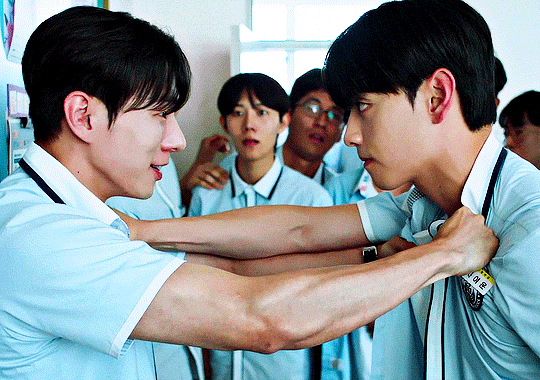
gif by @dramascene
And here again there is something recognizable to me in this dichotomy. Myungha likes Yeowoon, Myungha wants to be friends with Yeowoon, every time something bad might happen to Yeowoon, Myungha is there to intervene. But Myungha is convinced that the potentially negative events that might occur during a debuff are because of him, and so he avoids Yeowoon as much as he possibly can. To me this makes the debuffs a stand in for depression symptoms. Myungha has convinced himself that he is the cause of the bad moments in Yeowoon’s day. Myungha has convinced himself that Yeowoon would be better off if they weren’t friends, because he only makes things worse. And that is not something he can easily shake off, it’s not something he can logic his way out of, that’s the game, that’s just how it is. And so he withdraws until Yeowoon comes to him.
And honestly thinking about it, nothing bad really happens during those debuffs. The light doesn’t shatter, the boys back off on the bus, Yeowoon doesn’t punch Sangwon. Maybe the reason why nothing at all happens is because Myungha intervenes. Maybe if Myungha hadn’t been there, the light would have broken, maybe if Myungha hadn’t been there Yeowoon would have punched Sangwon. But that is not a lens that Myungha is capable of viewing himself through, that is never an option that crosses Myungha’s mind because he is too focused on feeling like the cause of Yeowoon’s problems.
System Errors
I know there is a lot of confusion or at least uncertainty around the system errors. Why are they happening? Where are they coming from? For me, I think the answer is Myungha himself. The first time we get a system error, it’s in Episode 6, what I think is the day after Yeowoon and Myungha have their first kiss and very soon after Yeowoon and Myungha kiss on the rooftop at school. The first error isn’t subtle, but it’s not explicitly stated. Myungha walks in to a room to take a phone call and walks in to the middle of band practice, falling through the world as he tries to remove himself from the situation until he (literally) runs in to Yeowoon. Myungha goes home that night and gets his first moments in the black abyss, and the first explicit mention via pop-up of a system error. I have not gone through (yet) to track every instance of what happens before a system error pop-up occurs from that point on, but I will say moment that was most legible for me in terms of indicating that these system errors were stemming from Myungha himself were when he gets the notification both times that Yeowoon looks directly at him and tells Myungha “I love you.”
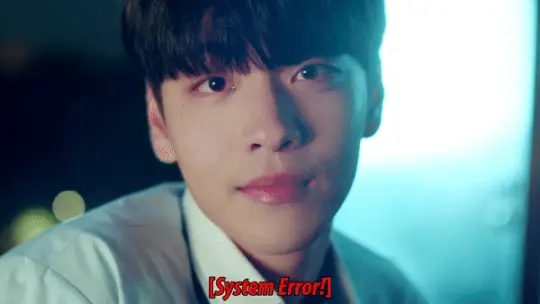
gif by @dragonsareawesome123
That moment was a guy punch for me because I was not able to see it any other way except that Myungha is so incapable of believing that people could actually love him that someone telling him directly and sincerely that they love him cannot exist in his world. He literally cannot compute it, and thus an error occurs. Again from the perspective of depression, or trauma, or what have you, this is familiar to me. It is perhaps the most reflective part of Myungha to my own psyche. Neither of us know how to be loved.
Myungha is called out on this repeatedly, he is nice to everyone, he does so much for everyone and refuses to ask for help himself. I’m the same way, I will bend over backwards as much as I can to help the people that I care about, but it is a rare occasion where I can ask for help myself. I’m not sure if this is the case for Myungha, but for me at least a lot of that stems from needing to make myself useful to people in some way so they keep me around. And so I end up feeling like a commodity to the people that I care about and help, and merely tolerated by anyone else that I do not help but that interacts with me any way. Myungha is called out consistently by multiple people, real or NPC about this similar habit. Myungha does not want to be a burden, Myungha only cares about other people’s happiness, Myungha is not happy himself and has maybe never been happy and so he pours everything he can in to lightening the load for others.
He loves Yeowoon, but to be loved by Yeowoon is different. To experience any moments of joy cannot possibly be real. Maybe I am projecting too much on to the character, but it makes complete and total sense to me that Myungha’s worldview would break down upon having someone state wholeheartedly that they want to be a support system for him.
Cruel Choices
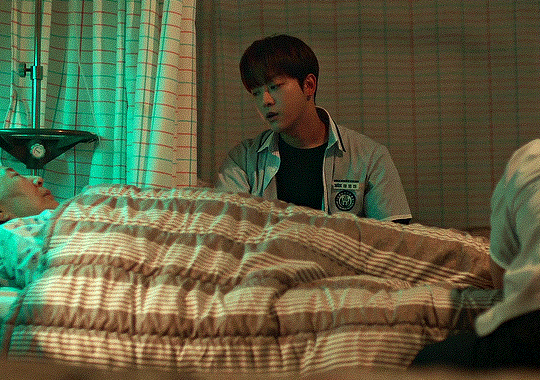
gif by @dramascene
With the enmeshment of depression and video game mechanics in mind, I want to talk about the scene at the end of Episode 6. I love this scene so much for a number of reasons:
It turns the game on a head for me as we slip further and further in to a nightmare scenario
It raises the stakes and attempts to get Myungha to make a hard choice
It forces Myungha to think about what is important to him
It’s ultimate purpose and who is posting the mission is ambiguous/uncertain
I’m going to focus on number four. I think it is a perfectly valid read to see this and all video game mechanics as designed by The Author in an effort to help Myungha change Yeowoon’s story in which case this mission feels particularly vindictive and cruel. @lurkingshan posed the question in a conversation we were having about Love for Love’s Sake, where she wondered why the game could not hold two sources of love for Myungha at once. I love that question because it made me realize how differently this show can be read and how important who you choose to read as the entity in control of this game is for what this scene specifically means and I love so many interpretations of it, I love the interpretation that is was simply cruel, I love the interpretation that in retrospect this was the Author being angry at Myungha for dying, I love the reflection from @jemmo that said this felt like a choice between staying rooted in the past (sparing grandma) or choosing a future (sparing Yeowoon)
For me, I think I am leaning heavily in to the pop ups are under Myungha’s subconscious control, his mind, the missions he thinks are important, the problems he thinks he is causing are what is driving the base game. Because of this my base instinct is to lean in to the depression/anxiety/trauma tent where things have been going a little too well for him lately and he has convinced himself that he is due for something bad to happen. I am happy to once again acknowledge that this probably projection, but I know that my own mental illness(es) does not let my peace linger for long. Myungha is spending so much time with Yeowoon, Yeowoon who grounds him when his world is literally falling apart. Yeowoon who cannot contain his smile whenever he is around Myungha, Yeowoon who is downright desperate to bestow love and support upon Myungha, Yeowoon who has accompanied Myungha to the hospital late at night to be there for his boyfriend in a stressful time, and Myungha can’t have that. He loves his grandmother, he loves Yeowoon, they both love him and so obviously means that something bad is going to happen to them.
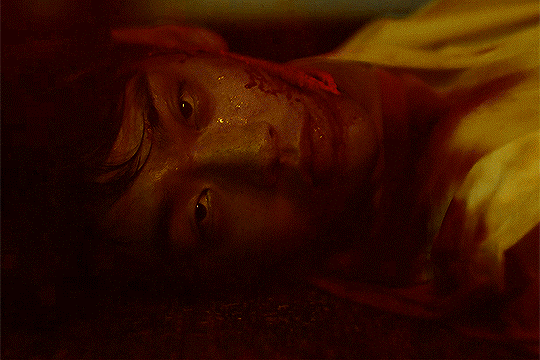
gif by @25shadesoffebruary
[As an aside I am thinking about what the Author said in the final episode about wanting Myungha to be able to see himself from the outside, and how I took that to mean Yeowoon is supposed to be a reflection of Myungha and a journey to self love, and how Yeowoon told Myungha that something bad always happens to the people around him in relation to this hospital scene]
Secondarily, I do think being confronted with this choice at all allows Myungha to have a moment of reflection, and is clarifying for him to know that both Yeowoon and his grandmother are important people in his life that he doesn’t want to lose. That’s fucking huge, in my opinion at least. And for all this mission was cruel, it was the first time Myungha refused to complete the mission. He was asked to save one, he decided to save both, and the game could have been cruel and taken his grandmother and Yeowoon away for refusing to choose, but it didn’t. They both got to live, and sure Myungha’s mission to make Yeowoon happy was shortened significantly, but I do think fifteen days was enough time to be successful in his mission if the depression and the grief had not gotten to Myungha instead.
Grief

gif by @my-rose-tinted-glasses
Something about grief that my therapist told me once was grieving people love helping others. And I think that is the case of Myungha here just based on the way he throws himself in to helping as many people as he can, especially Yeowoon. He knows Yeowoon is grieving, he knows Yeowoon is struggling, and he can distract himself from his own shit by helping Yeowoon instead. But once Myungha is confronted with the possibility that either one of the people that he loves could die, the penality for failing in his mission to make Yeowoon happy looms over his head like a knife. Just like Myungha considered himself the problem with the debuff, he knows how high of a likelihood it is that Yeowoon would regress, would isolate, would sink into a massive low.
And it would be Myung’s fault (in his mind).
Especially because Yeowoon keeps saying that even thinking about going on dates with Myungha is making him happy but Myungha’s mission isn’t complete. Myungha has started to get low, he is not as engaged in his relationship with Yeowoon, he’s convinced himself he is going to fail, and is thus setting himself up for failure because he decides 15 days is not enough time to find happiness, but it is enough time to break somebody’s heart in preparation for a devastating loss. And maybe, maybe Myungha would have snapped out of it with enough time to spare initially, but any hope of that being the case was shattered the second Yeowoon admitted that he wasn’t happy because Myungha wasn’t relying on him.
Myungha is so used to be self-reliant there is no way for him to break out of that habit in just two weeks. Myungha knew his death would hurt Yeowoon, but the final nail in the coffin for him was learning that his life was hurting Yeowoon too. And he almost got there, he almost did it, he admitted that he didn’t know how to, but he withdrew at the last second. He has spent all this time, all this energy, all this focus in to changing Yeowoon, he does not have the space to do that for himself.
The Choice
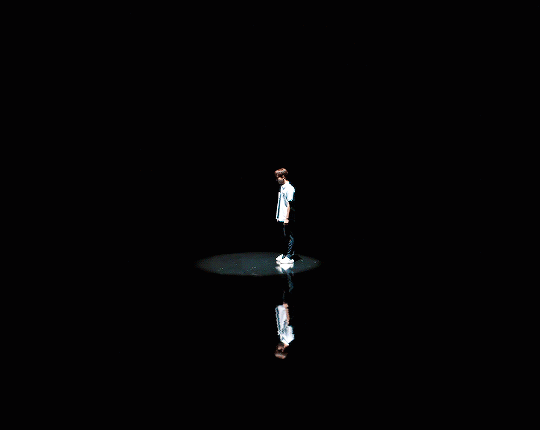
gif by @supanuts
The last moment I will really speak to as it relates to my interpretation of this game being controlled by Myungha as a manifestation of his depression is the author’s pen. Considering the fact The Author asked Myungha if he wanted to try again, I do not think if the Author was controlling this game world that he would have had Myungha disappear from it. Because according to the Gaga subs, the change that Myungha writes is that he wants Yeowoon to be happy, and immediately upon finishing that request, Myungha starts to fade.
If we hold these game mechanics as manifestations of Myungha’s depression, which I do, it makes complete and total sense to me that Myungha would fall back in to the pattern of believing that Yeowoon would be happier if Myungha wasn’t there. Yeowoon has a modeling deal now, he has some modicum of fame, he has friends now, he has supports in place that he did not have before, so what need does Yeowoon have of him, when his inability to let people love him is what is now causing Yeowoon to feel sad.
And I think that massive server error at the end where the world is burning and the universe is melting in to the game is a result of Myungha realizing too little, too late that this isn’t what he wanted. But it can’t be undone. The line he says when he is sinking in to the water about how at the last minute before he died, he regretted it. The game, the drowning here are one in the same to me.
And for me there was just something so beautiful and hopeful from Myungha telling The Author that he wants to try again. We started the show with Myungha telling The Author miserable people can be happy, and we end the show with Myungha and Yeowoon finally getting the happy ending they never thought they would have.
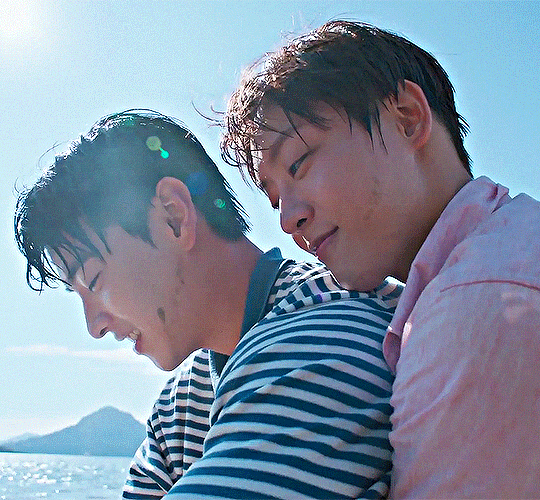
gif by @junghaesin
God I loved this show.
#love for love's sake#lfls#love for love's sake meta#love for love's sake analysis#one thing about this show is that it almost certainly will lend itself well to a rewatch!#and I *love* rewatching shows#wka long post
375 notes
·
View notes
Text
The HUGE analysis - This season starts and ends with a discussion, doesn't it?
Ok, my loves. This was one of the really long metas I've been working with, and probably the one that has taken me the longest (because it depended a lot on rewatching the season time and again).
I couldn't help to notice that the fist interaction Aziraphale and Crowley have in season 2 is a fight, really. Yeah, we have the beautiful “in the beginning” sequence, with both of them being angels and happy and all the such (oh, how lovely, Neil Gaiman planting the seeds of why it will matter to us that Aziraphale will not be fighting the idea of inviting Crowley to Heaven, because he remembers that happy, careless guy). But after the intro, we see them having a big disagreement… And we end the season in the biggest disagreement they have had, probably, in 6,000 years.
I love over-analyzing and dissecting narratives and characters, and more so if I can use only what we’ve been shown in the screen. Therefore, I believe that the first fight of the season tells us a lot of the things we will need to know to understand the final fight of the season between them. Let’s take a look, shall we?
The first fight is motivated by having an amnesiac Gabriel in the bookshop.
They see the same circumstance: Gabriel in the bookshop means trouble with Heaven. He is also an individual risk, because he has menaced Aziraphale directly (well, Crowley under the visage of Aziraphale).
It affects each of them differently: even when they both panic, Aziraphale feels compelled to be kind to Gabriel (gives him a blanket and hot cocoa) while Crowley has a full-on panic induced reaction and gets defensive.
They propose opposite solutions: Azi wants to do the Good thing, taking the “higher road” (help Gabriel), while Crowley wants to do His Own thing: “Protect the precious, peaceful, fragile existence I have carved for myself”
At that moment, Aziraphale corrects him and marks a “we”, which is very interesting. But immediately after that, Aziraphale gets all "my way or the highway".
Crowley asks for clarification, with a well-leveled tone of voice: “Is this how it is going to go?”
Azi clarifies "no, I want you to help me!" But then he does the passive-aggressive thing: "if you won't, you won't". (oh, Aziraphale, how you triggered me here, my dear chap. I was angry at the character the first 6 times I saw this)
Therefore, Crowley is out. He marks a clear limit: “I won't. You are on your own”, and then storms out. No Eccles cakes would help him: he needs a breather and counting to 10. That doesn't help either.
Crowley only comes back after gaining an extra perspective: the "extreme sanctions" talk with Beelzebub.
When he comes back, Aziraphale will stand his ground: he feels he deserves an apology, which is delivered via a “I was wrong, you were right” literal admission (even when he probably wasn't "right", but that's their way... And they've been doing it since 1650, or so they say). Then they are able to work together again.
Now, let’s see how this dynamic plays out in their last discussion of the season:
They come from different sides of the same experience: Crowley went to Heaven to investigate and learned about the plans to continue with the end of the world, while Aziraphale stayed defending the bookshop. Then Crowley saves the humans, while Aziraphale solved the Beelzebub + Gabriel affair.
They haven’t had time to talk, as they get interrupted by The Metatron. While he takes Aziraphale, Crowley receives a visit from Maggie and Nina.
Each one of them gained an extra different perspective: Azi, the Metatron proposal (and veiled menace); Crowley, the pep talk/scolding from the couple they were trying to get together.
This makes them develop different solutions:
Crowley wants to finally admit what Azi has been saying all the season: they are a "we" (Azi said so when Crowley talked about his “precious, peaceful, fragile existence”; he said it again when talking about “our car” and reinforced it with the bookshop)
Azi wants to take the "higher road": go to Heaven, reinstate Crowley as an angel, so they can still work together.
Crowley sees the “usual dynamic” of their disagreements coming: it will be Azi’s way (or the highway). That has happened before, in front of our eyes, and not only in this season: it happened also in season 1, but we have already attested that it is still happening, and it is even “worse” (Aziraphale being a little “petty” with the “if you do, it is fine, but if you won’t, you are on your own” in the Gabriel discussion).
Crowley gets indignant. He asks, tentatively, if he told him where to stick it… And then he reinforces his belief. We are better than that, YOU are better than that, you don’t need them, I don’t need them; then he makes the first mention of the offer of getting back to Hell (which he hadn’t shared with Aziraphale), and makes a new point: I said no, neither should you!
Aziraphale goes back to the “you are the bad guys!” thing. Heaven being the side of Truth, of Light, of Good… It is not the propaganda Crowley needed for this move.
Crowley then clarifies the fallacy in his logic: when Heaven ends life on Earth, it’ll be just as dead as if Hell ended it.
Aziraphale then sees the "undesirable result" coming: Crowley is not going to accept, not with that argument.
Crowley makes his plead grow in urgency: Tell me you said no.
Aziraphale’s pitch of voice goes high (usually used as a sign of distress): “If I’m in charge, I can make a difference.”
Crowley understands. This is his “my way or the highway” moment. That’s why he comes up with the courage to make his half-proposal-half admission.
Crowley never gets to state out loud the “I want us to be together in a formal way” part. His voice breaks before he does so. He mentions all of the reasons they have to stay together, which Aziraphale already knows: we have been together for a long time, we’ve been a group (“our own side” was the way he always said it before) and we’ve spent our existence pretending that we aren’t (Azi also knows that! He has been working hard into making Crowley notice it!)
You can see, when they shoot Aziraphale’s face, he squints a little during that moment: maybe questioning, a little disbelief? As usual with Michael Sheen, it is a blink it and you’ll miss it moment.
After the grunt, Crowley proposes his alternative solution: going off together, using Beelzebub & Gabriel as an example that they could.
Therefore, what Aziraphale has just listened is what he already knew: yes, they are a “we”. Crowley wants to run away (he had proposed it twice during the Armageddidn’t, another pattern they have already established).
The next step is the usual way for Aziraphale: he reinforces his proposal: come with me, to Heaven. Ill’ run it, you can be my second in command. This idea has rubbed me wrong since the first time I watched this scene. Why remark the hierarchy? (not to say that I’m in Crowley’s side in here, but… It was weird and uncomfortable to think of them in a vertical power structure; they have always been equals).
Then, he goes back to making a difference, only it is “we” this time. Crowley is noticing he won’t back down… But Aziraphale usually doesn’t.
“You can’t leave this bookshop” works as a representation, a figure of speech. “This Bookshop” is “This life we have been building”, and they both understand it as such.
“Oh, Crowley… Nothing lasts forever…” For Aziraphale, it means he can leave this for something greater. For Crowley, it means… Actually, the same. But without him. Because he knows the “my way or the highway” side of Aziraphale, and none of them will budge. Aaaaand… that’s Crowley heart breaking. The rest of the scene happens with Crowley in “breakup mode”.
Aziraphale is used to “the discussion dance”. He Insists, “Crowley! Come back, to Heaven, work with me! We can be together, Angels! Doing good!”. He promises all he can: “come back, work with me, we can be together”, which have always been Crowley’s triggers to change his mind. However, the problem lies within the “angels doing good”. That’s the part that Aziraphale would need to let go before getting back to Crowley.
And then, he breaks down: “I need you!!” That has always worked! Aziraphale knows that Crowley loves being needed, he won’t leave his angel when in need, right?
And then, he gets angry. And he questions if Crowley has understood what he is offering, which transforms in an “I don’t think your exactly and my exactly are the same exactly” all over again.
Crowley is already brokenhearted, so he answers truthfully, as far as he knows. He understands how terrible the offer of going back to heaven is for both of them, and is not aware of the veiled threat in Metatron’s offer. He knows that going back to Heaven is a non-negotiable boundary, and Aziraphale is absolutely determined to cross it.
Aziraphale, then, does his passive-aggressive shit again: “I guess there is nothing more to say”. My guy, my love, you need to become better at negotiating with your loved one.
This is where Crowley decides to show, don’t tell, the hurt: no nightingales. And then… The “You idiot. We could have been… us” (no, you couldn’t, it was always too late!!! First the pandemic, which I’ve decided to treat as canon, then Gabriel. They never stood a chance).
In this context, Crowley’s kiss is a desperate way to say good-bye to the person he cared most for the last 6,000 years; also an angry way to regain some semblance of control and affect Aziraphale; and a final way to get some “closure”. Is there desire? Is there love? Maybe. But they are lost in a cocktail of emotions that have been stated during the rest of the discussion.
The angry “I forgive you”, which is also a usual dynamic for Aziraphale when he is angry with Crowley, gets there too late for Crowley to react to. He has already “checked out”. That’s why the “don’t bother” feels almost like an afterthought and comes after a small sigh.
After watching this 16 times, I’m pretty confident that the first thing Aziraphale mouths is a “no…” and then… he sobs a little. Michael Sheen, you’re a beautiful actor. The rest of it is a masterclass in using microexpressions to convey a whirlwind of emotions in under 2 minutes.
Sooooo... Did I hurt my own emotions while writing this? Yes. Did I absolutely need to do so? Also yes. Even when I like doing intertextual readings (and that's why I like bringing some theology to some of my musings), reading what is in "the text" (in the scenes we have watched, in the dialogues we've been shown) gives me an enormous amount of pleasure, and I find a lot of comfort in believing that most of the things that I'll need to understand and enjoy a great piece of media are being given to me inside it. And I believe Good Omens is a great piece of media!!
I have no Shakespeare to offer you this time. Let me know what you think!!
#good omens 2#good omens meta#good omens spoilers#ineffable divorce#the final fifteen#narrative analysis#character analysis#good omens#anthony j crowley#aziraphale#If I was into Academia this should be counted as a journal referenced publication#Making my Comms Sci degree useful for something
469 notes
·
View notes
Text
Honestly if any Dungeon Meshi character deserved an expanded role in the series, it should have been Rin. She's the character to me who most feels like her story is incomplete and glossed over...probably the one instance where the manga actually frustrated me with its refusal to engage with her as a character in favor of Kabru.
I mean, the backstory Kui gives her in the extra content is, like all of them, really well thought out, but in the manga itself a lot of the time she kind of just exists as an accessory to Kabru? Like, she's the Girl who Likes Kabru to Establish that Girls Like Kabru...there's a couple moments in the manga where we see hints of a deeper character, but most of her story is relegated to the extra content...which sucks because I think her role in the story and especially her history with the elves is so incredibly important to understanding the wider world.
Because we mostly learn about the elves through the eyes of Kabru, and while Kabru didn't have a great experience with the elves for sure, he was doted on, a golden child. We do learn that Rin was treated terribly by the elves in the manga, but again, we learn it through Kabru's words and it's not really something that's focused on. I think Kabru has genuinely good intentions and cares a lot about humanity, but unconsciously he has a tendency to treat people like pawns in a similar way that the elves do; part of his character arc is learning to be actually genuine with people, but that only actually happens once he's separated from the rest of his party, with people he barely knows. It makes sense for him and the place he's at, but I can't imagine how frustrating that must have been for Rin, who doesn't really have anyone else. She's trapped in an unresolved character arc, left in this limbo space of chasing after someone who just doesn't have the same reliance on her that she has on him.
If I were writing the manga, I would have made her a character of equal importance to Kabru. Rin would balance out his role in the story...she's more pessimistic than him, for good reason, and despite or maybe because of the ease in which he traverses the social and political worlds, in many ways I think she understands the world better than him. I want to see the world from her perspective, to learn more about what her view of the dungeon is and why she's supporting Kabru in his quest to become the next dungeon lord, to see her grapple with her trauma, for her to have to learn to lead the party when Kabru isn't there, for her to come into her own as a character. I also feel like she just would fill out the main cast in a really satisfying way...she could easily be a narrative foil for so many characters, Kabru obviously, but also Marcille, Izutsumi (God, think about the potential interaction between Rin and Izutsumi), Thistle maybe, there's probably more if I spent more time thinking about it
Also kind of going on a tangent here but she's sooo ignored on the fandom side. Frankly I think that whatever Rin and Kabru have going on is just as interesting if not more so than the relationships between Kabru and Laios and between Kabru and Mithrun, but I don't think I've seen a single post or art piece on this website where she's present in his life at all (or even not present in an intentional way that would serve her character.) To be clear I'm not saying that I ship them or whatever (kind of hate that word tbh) or think they should end up in a romantic relationship (I really do not think they should end up in a romantic relationship). But like. Come on. They're so important to each other's characters and she can't just be written out of his story.
#second choice for character I think deserved more time is yaad#rin dungeon meshi#rinsha fana#kabru of utaya#rinsha you deserve the world I would treat you better than him#dungeon meshi#dungeon meshi spoilers#dungeon meshi meta#dunmeshi
115 notes
·
View notes
Text
Liar Revealed
So Marinette and Sabrina worked together to lure Lila into a false sense of security that eventually led up to her spilling everything in front of an audience she was unaware of. Now everyone knows she’s been lying about everything, she’s a horrible person, and she and Chloé are about to be expelled for good... After 7 years, the fandom finally got what it wanted.
...then why do I feel like I’ve actually wasted those 7 years of my life?
Buckle up, ‘cause this is going to be a long ride.
As someone who’s been eagerly awaiting for Lila to be exposed since Volpina, a feeling that only grew with each passing episode she’s been featured in, I honestly find this development wholly underwhelming, highly disappointing, even.
Maybe I’m too vindictive, who knows, but this in no way feels like proper comeuppance for a character who’s been maliciously manipulating everyone around her and relishing in other people’s misery since she was first introduced.
First and foremost, because having Lila accidentally reveal herself while gloating is too much of a cliché. I’ve seen people before mentioning how Lila exposing herself seemed to be the only way this could go, seeing as Marinette’s best attempts always seemed to fail. But if we ignore for a second this was actually set up by Marinette and Sabrina, with the way it’s handled it just feels like a kick in the gut, not the overwhelming catharsis I’m sure most of us were expecting.

Because, and this is actually my main problem with the execution, by having Lila expose herself by spouting a self-satisfied tirade of every single lie she’s ever told and people have believed without question as she disparages Sabrina’s attempts to take her down, saying how she could easily turn everyone against her, the narrative is actually framing Lila in the right.
When we as the audience know it shouldn’t be like that.
Lila only really upped her game in season 5 (and even then the writers still rely too much on the characters being dumbed down around her for it to work), up until then all her lies would have been easily discreditable if the writers didn’t need the class and everyone in Paris to believe her for her schemes to work!

From our perspective, Lila is nowhere near as formidable as she presents herself to be. Which, admittedly, goes in line with her consistent characterisation (about her only consistent trait aside from being hateful and a liar) that she believes and presents herself to be more special than she actually is. But the problem is no character other than Marinette, Adrien, and now Sabrina ever learnt of this fact! Maybe now that she’s exposed herself, but with the way she gloated about all her plans going off without a hitch...
Which leads us to another reason this was the worst possible execution of Lila being exposed they could have come up with:
It was a stroke of luck.
That’s it. That’s unquestionably what it was. Because hadn’t Sabrina finally grown a spine and drawn the line with the actions she was willing to commit for Chloé’s sake, Marinette would have had no way of knowing of Lila’s plan and preparing accordingly.
Really, the only positive thing I can say about it is that it could maybe count as character development for Marinette since she finally learned she needed to be as sneaky as Lila if she wanted to take her down. And there’s of course the fact that Sabrina finally broke away from Chloé. Other than that? It’s a fairly sombre scenario, really.
Because, again, Marinette didn’t manage to finally beat Lila because she had a strong support network (which would have painted a very symbolic and meaningful picture showcasing how, for all the superficial attention her lies can get her, in reality, Lila will always be alone as long as she doesn’t put in the genuine effort to reach out to others like Marinette does), but because she had outside help. Again, help she couldn’t have accounted for until Sabrina herself reached out to her.
Relating to my previous point, Marinette never got Alya to even believe her about Lila or at the very least question how genuine she was until Lila spelled it out for her. Even though she’s known her best friend is Ladybug for months, which brings forth the question if letting Alya in on Marinette’s secret ended up being even worth it if the writers refuse to have her help her out where it matters (I’ll be sure to go back to this point in a minute, just you wait).
What else? Oh, I know! How about the fact that, for a season that was supposed to be all about Adrienette winning, the writers purposely robbed us of that Adrienette vs Lila alliance we were promised back in Chameleon, huh? Because Adrien was completely left out of the plan. In fact, ever since Ladybug back in season 3, he hasn’t been allowed to do anything to help Marinette against Lila. As with the Ladynoir conflict in season 4, his relevance all but vanished even though he was a central part of the conflict from seasons 1-3.
Even better! When he finally spoke up about Lila to Nino and Alya, arguably his best friends besides Ladybug, they completely brushed his concerns off as him just agreeing with Marinette out of boyfriend obligation! I didn’t know intangible things could slap me in the face, but boy was I wrong!
And the best part? This complete disregard of his feelings, lack of communication, and their assuming they know better than him (which disturbingly parallels to his own relationship with Gabriel...) is certainly never going to be explored, let alone resolved.
What do I mean with all this?
Well, basically that for a show that’s supposed to promote the power of love, friendship, and teamwork, when it comes to Lila Marinette is all alone. Has been since Volpina.
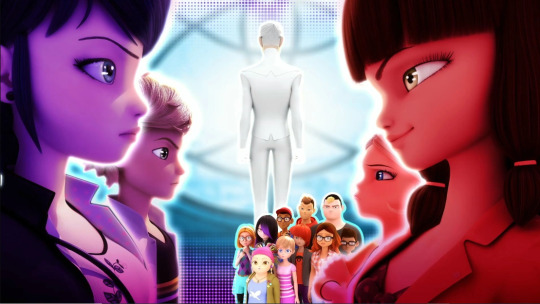
But at least that’s done with, Lila got her just desserts, and we’re never going to have to deal with her ever again...
SIGH
Except, not really. Not at all, in fact.
Because just as she and Chloé were finally being reprimanded for their actions, Mr. Damocles had to choose that of all moments to realise he failed as a principal, attract an akuma, cause a racket, and provide Lila with the perfect distraction to just...walk away unscathed.
And with the reveal that she actually has more identities, social circles, and opportunities to lie and manipulate to fall back to after being expelled from the Françoise-Dupont...Let’s just say it implies that while Marinette (and the audience) had to endure nothing short of psychological torture, Lila never really had anything to lose.
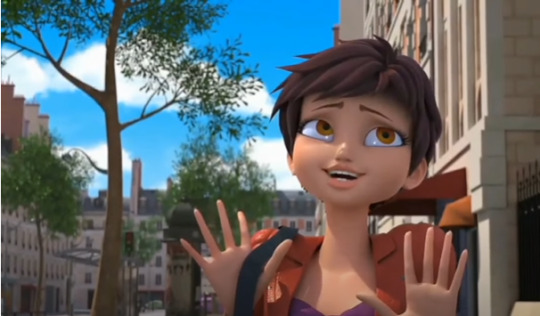
Now I ask you...how the Hell am I supposed to consider that a satisfying, cathartic resolution to that particular arc?!?!?!?
And if you permit me, there is one more thing I’d like to get off my chest.
Alya’s reaction to this.
After learning the truth she rushes to hug Marinette and apologise, being a clear wreck about it. And while Marinette getting an apology once in a blue moon is always a welcomed thing, once again the writers aim and completely miss their shot. Because Alya apologises for being gullible.
Look, back in seasons 1 and 2, Hell, even back in season 3, I could have overlooked this. Yes, she never listened to Marinette, could be a tad hypocritical, and the whole jealous thing got old and annoying fast, but at least she couldn’t know for certain Lila was bad news. But from season 4 onwards Alya no longer has such an excuse. No, from season 4 onwards Alya’s problem isn’t that she’s gullible, it’s that she willingly and repeatedly chose to blatantly ignore all of Marinette’s suspicions and warnings regarding Lila. Even after Adrienette finally became canon and Marinette had realistically no reason to feel jealous of Lila in any way, shape or form, Alya still couldn’t fathom that, perhaps, her best friend had her reasons for disliking Lila besides a love triangle.
The moment Alya learned Marinette is Ladybug, the two should have been allowed to talk about Lila, about the real reason Marinette hates her, and to work together to overcome this issue and bring her down. How do you expect me to be okay with season 5 opening to these two having daily sleepovers to talk about Marinette’s love life, but not a single second could be spared after Illusion to have Alya question why Marinette hates her so much, if not connect the dots herself since she is Ladybug’s best friend, not Lila, and Ladybug hates her?
I’ve seen people justify this saying it’s been a long time since Lila lied about being Ladybug’s best friend, and while I’ll argue the last time it was mentioned was actually Chameleon, not Volpina, I could see your point. Except that is not just another lie, like her claiming she knows Jagged Stone or Prince Ali. No, that is the lie that started everything.
It was because Lila lied about knowing Ladybug to impress everyone, especially Adrien, that Marinette completely lost it and chewed her out for it in front of him. It’s because of that lie and the consequent reaction it got from Ladybug that Lila even developed a grudge in the first place. It’s because of that lie that Marinette ever found out about Lila being a liar, because before she first lied to Adrien about being close to Ladybug, Marinette was panicking because she had no chance against someone as incredible as her. If she hadn’t lied about knowing Ladybug, Marinette would have been as fooled by her as everyone else and the two might have never really come to blows.
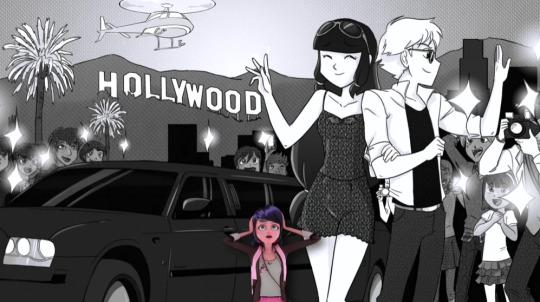
So don’t tell me it was never brought up because it was so long ago and it doesn’t matter anymore, when that particular lie carries so much weight and we all know the real reason they couldn’t have Alya in Marinette’s corner is because the writers know Lila needs everyone around her to follow her blindly for her lies to work and everything to always work out in her favour because otherwise she just doesn’t work as a villain.
TL;DR: If you want a good resolution to the Lila Gets Exposed plot, pick literally any fanfic dealing with this exact premise. It’ll be better, I promise.
#miraculous ladybug#ml#mlb#ml spoilers#ml season 5#ml season 5 spoilers#ml s5.21#confrontation#ml salt#ml analysis#Marinette Dupain-Cheng#sabrina raincomprix#adrien agreste#lila salt#alya salt#lila rossi#alya césaire#chloé bourgeois
698 notes
·
View notes
Text
Aziraphale and Crowley's unhinged character analyzis (pt2. Crowley)
Controversial opinion:
Aziraphale and Crowley at the end of Season2 managed to accomplish the main goal they each had since the beginning of time. Only to realize that what they wanted no longer made them happy.
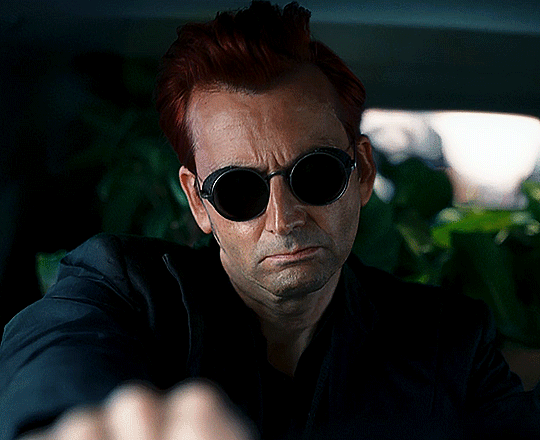
Disclaimer: I have no idea about what is going to happen in Good Omens. This analysis could clearly be considered a theory since I'm not Neil Gaiman, but as someone who knows about narrative and character structure, I'm going to elaborate. Also, English is not my first language, so sorry in advance.
I've already talked about Aziraphale's possible transformation arc in the Good Omens story. In here I've also written important definitions such as what's a transformation arc. I highly recommend it to read it first.
Now it's time to talk about Crowley.
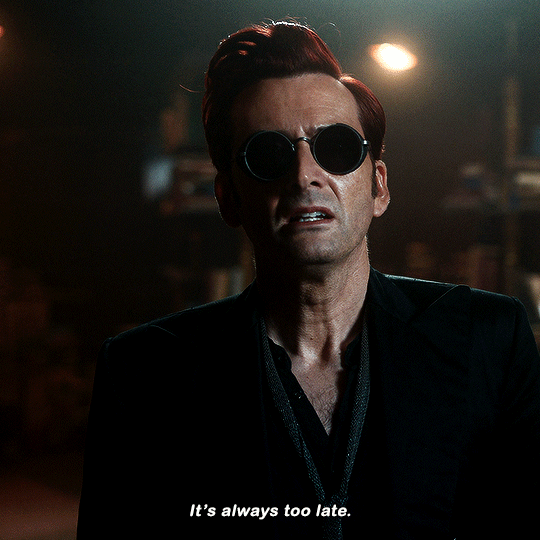
Crowley, the co-protagonist and love interest.
In our role as audience, Crowley is the character with whom one tends to empathize the quickest. By the end of the second season, most would be tempted to think Crowley was right. However, this is a lie. Not only is Crowley not right, but he rejected Aziraphale just the same, choosing his principles over love.
Now, why in the first instance do we not see it that way? Well, because we have Aziraphale's point of view. We always get the angel's reaction first, we always see the way Crowley shows up again and again and again to rescue him unconditionally.
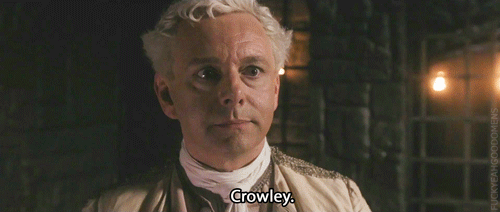
Very rarely do we have a moment where Crowley is alone in crisis because his beliefs are challenged. No, everything he does is in function of Aziraphale and we see the story from his perspective, that is, from the perspective of someone who is in love with Crowley. Because of this, Crowley is equally liked and attractive to everyone equally: we are inside Aziraphale's in love POV.
By the time Crowley proposes Aziraphale to run away together, we as the audience are seeing a proposal that is incredibly tempting to us: we want Aziraphale to accept it because it's what Aziraphale really wants. That's why the fight hurts so much, because we know internally that the two of them had the chance to be together but didn't because they're not ready yet.
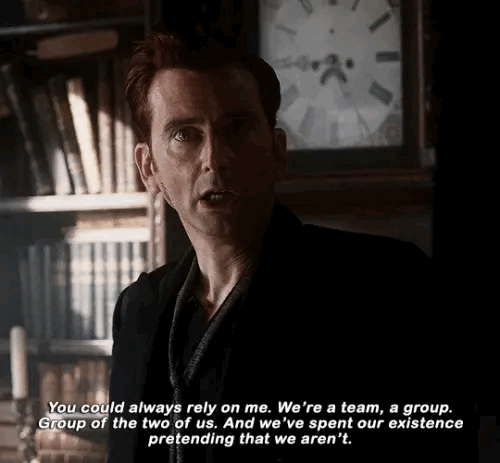
Crowley's Objective
Crowley, unlike Aziraphale, was happy in Season 2 with his current situation. Having cut ties with both Heaven and Hell pleased him, because Crowley always sought only one goal throughout his entire life: freedom.
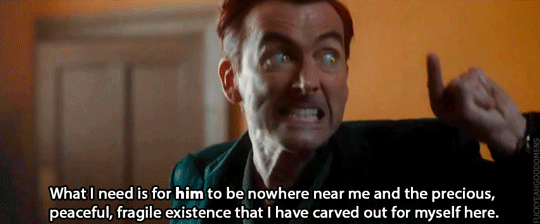
The one thing Crowley has always desired is to be himself with no excuses and no strings attached.
Since before the beginning of time, Crowley came to the conclusion that he didn't fit in Heaven. He thought he would fit in Hell, but soon realized that it was like a deteriorated version of Heaven, so he didn't fit in there either. On Earth he doesn't quite fit in either. Sure, he likes humans, has a certain admiration and curiosity for them, but he still considers them a species far different from his own. He is not human and never will be, so he can't really identify with them at all. He enjoys the advantages of humanity, but he is not one of them.
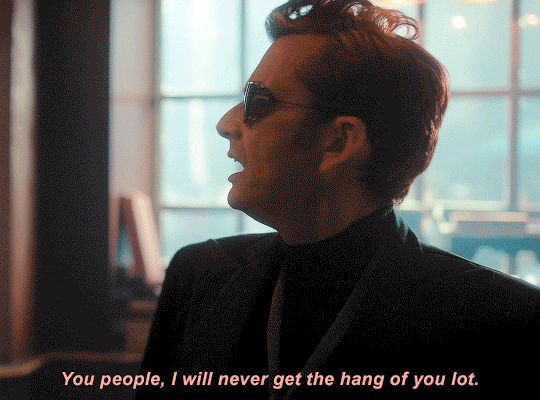
The Job episode is an indicator of this, he himself says so "I am a demon who goes along with Hell as far as I can".
In this same episode, however, the major problem he has with this is also expressed. Azira tells him "that sounds lonely". The counterpart of freedom is loneliness. To be truly free, you need to have nothing and nothing to bind you. That's why Crowley is someone who is unsympathetic and even disinterested in dealing with third parties. He does not remember faces or names, he does not get significantly close to anyone because that would compromise his desire for genuine independence.
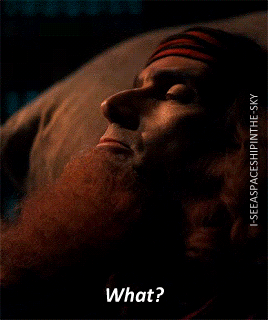
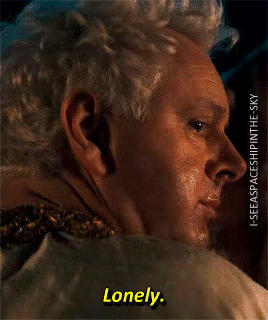
This characteristic is the only one that is present in absolutely all versions of Crowley: the book, radio drama and even in the cursed script of the movie that never was. That's why whenever he sees danger, his first reaction is to run away.
Being free he has nothing to lose… or does he?
Crowley's dilemma
Well, Crowley never fit in by being different and so he always felt somewhat an outcast. However, it wasn't long before he noticed that Aziraphale was also different.
Clearly the angel was not like the other angels in Heaven: he enjoyed Earth, he fell into temptations, he lied to other angels. Also, it is obvious that he would not fit in Hell, and while he is more empathetic to humans, he is still innocently aloof. Aziraphale has a pure goodness that Crowley admires, the goodness that made him be kind to the demon in the first place.
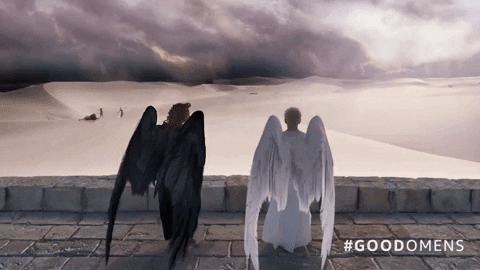
Moreover, no matter the time, no matter how little they knew each other, Aziraphale could always see through Crowley's evil masquerade. The demon could burn goats and murder people, and yet Aziraphale has always held a blind faith towards him. Crowley, the Serpent of Eden, who had been his entire existence told that he's doomed to be a crawling tempter, finds in the angel an unexpected possible friend who's never been afraid or bothered by him.
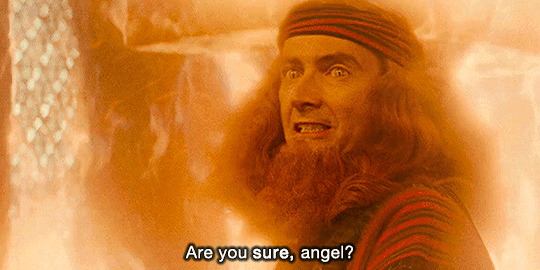
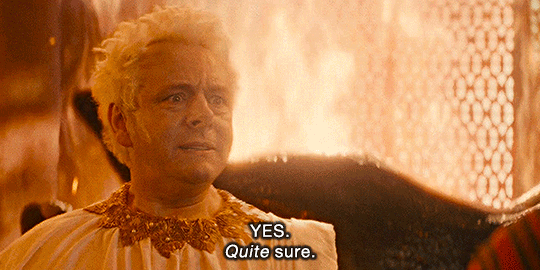
Crowley eventually feels they are both the same: two supernatural entities left on Earth who learned to enjoy life on their own terms. Crowley sees in Aziraphale the companionship he never thought he'd find, the friend he thought at the moment he fell he'd never have. And that feeling of companionship and admiration slowly morphed into something more until it became love.
The season finale isn't the first time Crowley has considered leaving Earth. Probably not even his fight in Season 1 was the first time he considered it. Yet he never did. He never could because, without Aziraphale, running away would doom him to a life of solitude. Free, sure, but completely alone since no one except his angelic friend could understand him.
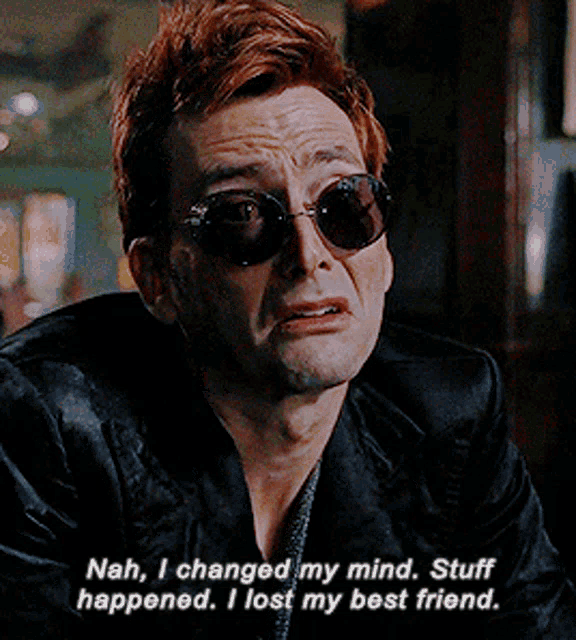
However, I think Crowley is not aware of what he feels. Or at least, he hasn't been for a long time. I'm sure his moment of introspection about his feelings was when Nina confronted him about it. Up to this point, Crowley considered Aziraphale his best and only friend, obviously. Crowley is loyal to a fault and always thought his relationship with Aziraphale was perfect just the way it was, but suddenly someone put it into words and he realized that yes, that's what he really wants with Aziraphale.
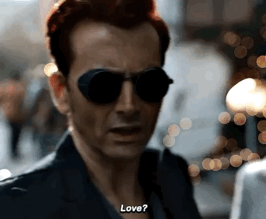
Crowley's decision
Crowley wants his freedom. That's why he never asked Aziraphale for explanations (because at the end of the day they were just friends), that's why he never told him that he was living in his car (because he would end up depending on him), that's why he never talked about his fall (because that would be opening up too much).
The most ironic thing about the whole ending, is that just like Crowley did with Aziraphale… Aziraphale proposed to Crowley the one thing he wants more than anything: to be together, for good, but sacrificing his freedom.
Crowley is capable of doing anything for his angel, even without acknowledging that what they had was love. He's capable of driving on fire, capable of killing Gabriel, capable of walking inside a church. Of everything except one thing.
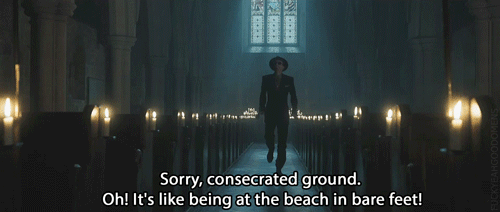
It's the one step Crowley didn't dare take. He is not a martyr like the angel, no, he is not willing to sacrifice himself to be together. So, the obvious happened: Crowley chose his freedom over Aziraphale just as Aziraphale chose Heaven over Crowley.
The end of his arc and Aziraphale.
As I said before, I don't think Crowley will have a significant change comparable to Aziraphale's. His personality and beliefs will not be changed in a momentous way, as Crowley no longer has ties to Heaven or Hell by pulling the tab on both sides.
His side is already picked: Humanity.
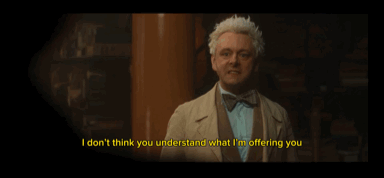
His biggest change is likely to be one of purpose. Crowley is no longer going to be satisfied with his freedom. And the latter is a fact: Crowley is officially free. Without Aziraphale in the equation, he no longer has anything or anyone tying him to do anything or be any other than who he truly is. Crowley can go to Alpha Centauri and never come back; he can sleep for 3,000 years; he can go around the world in the Bentley. He can do whatever he wants. This might seem ideal to the Crowley of 300 years ago, but today's Crowley is completely consumed by loneliness.
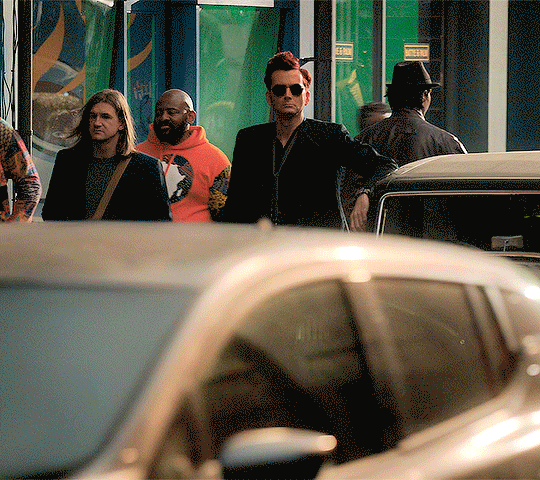
Crowley never cared about building a home or having material things because he never wanted to be tied to anything earthly for the sake of doubt. He was always aware of the destruction of the Earth.
Love is not something that can be prevented though, and in the absence of having a home, he found it in Aziraphale.
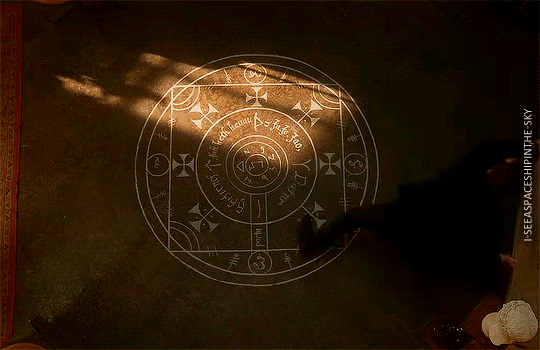
Aziraphale: trustworthy, sweet, warm, funny, a bit of bastard but always irrevocably good. Everything Crowley lost when he fell he almost automatically found back.
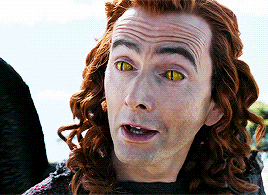
To this day I wonder what Crowley is going to do now that his angel is gone and the possibility of him fleeing to the stars is becoming more and more possible. It's going to depend a lot on how much time passes between seasons, but I don't think it will be much. For not only he was his anchor, no, without Aziraphale, he doesn't have someone to cause him to want to do better, he doesn't have someone to be vulnerable with, he doesn't have a goal anymore, nobody else to impress.
He isn't evil. He isn't good. And now, he is alone.
First Crowley lost the love of God and now the love of Aziraphale. And it is then that Crowley will realize that what he really wants is not to be free, but to be loved. And this desire can only be fulfilled by the love of his life, Aziraphale.
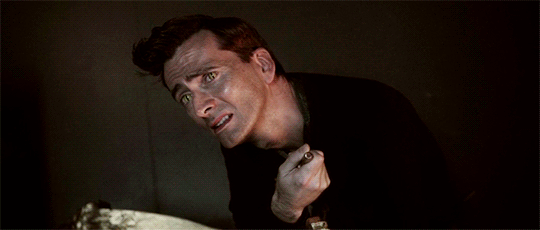
The thing is... Crowley has always wondered why.
Why falling? Why becoming the cursed Serpent? Why could he never be truly free?
At the end of his arc, he must come to the conclusion that the answer was always in front of him:
Love is the only answer he needs.
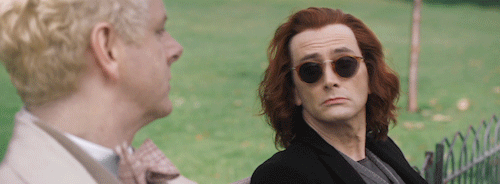
#why? Love#good omens#crowley#good omens meta#good omens theory#neil gaiman#terry pratchett#good omens crowley#ineffable husbands#aziracrow#character analysis#give me season 3 or give me death#good omens season 2#amazon prime#freedom#demon
273 notes
·
View notes
Text
Is Only Friends Slut-Shaming Boston?
I’m going to be real honest here. When this idea first started making the rounds, I just thought it was a bad take, but then so many people were saying it that I started to wonder if I had missed something. So, I rewatched the finale and now can confidently say…it’s a bad take.
Do I think the narrative is punishing Boston? Abso-fucking-lutely! But is it because he’s a slut? No, of course not. (All of these assholes are sluts!) Boston is being punished because he slept with his best friend’s boyfriend. And—hot take—but I don’t think that’s an unfair reason for the narrative to punish someone. Even sluts need to have boundaries sometimes.
The first major complaint I’ve seen is that the narrative is slut-shaming Boston by making him the only character who ends up alone (which is categorically untrue because Nick also ends up alone, but that is neither here nor there.) This story only had two possible endings: either Boston ended up alone or he ended up with Nick. And I think, if given the choice, this is the ending Boston would have chosen for himself. This isn’t a sad ending for him. He’s unhappy being in a monogamous relationship. This is what he wants.
This is also just a ridiculous argument altogether because if you think Only Friends is slut-shaming its characters, the last thing you should want is for one of your sluts to suddenly decide not to be a slut because of the healing power of love. I would argue that forcing a polyamorous man into a monogamous relationship would be even more sex negative than what happened in canon.
And for those saying polyamory should have been considered, I would just like to remind you that there are two people in Boston and Nick’s relationship and they both deserve a say. That is, very literally, what ethical non-monogamy is. It has to be consensual.
From day one, Nick has wanted to be in a monogamous relationship with Boston. That’s what their arc is all about. And when they finally get together in episode eleven, Boston makes it explicitly clear that monogamy is one of the terms he’s offering. So while I think it’s perfectly valid for Boston to want a polyamorous relationship, I don’t think it’s fair to expect Nick to just accept that when he was promised differently. The central conflict here is not Boston’s promiscuousness. It’s that Nick wants a monogamous relationship and Boston doesn’t. And that’s okay! Boston is free to live his “fun and sassy” life as Nick calls it (with no judgment whatsoever), but Nick is also free to live his.
People have been dragging Sand for telling Nick not to “lower his bar” for Boston, insinuating that this is slut-shaming language, but I actually think the conversation between him and Nick perfectly illustrates why this whole situation with Boston is not slut-shaming. Sand spells it out clearly: “People have different ideas about this,” i.e. “You and Boston have different ideas about this. He wants one thing, you want another. Don’t change for him.” He never suggests that Boston’s way of living is bad, he is simply saying that it’s not compatible with Nick’s.
The only argument I have heard in favor of Only Friends slut-shaming its characters that I feel holds any water is that Boston never received a proper apology for any of the horrible things that were done to him—but then again, neither did Top. Now this could certainly be because Top is a slut, too, and therefore doesn't deserve apologies, but I think it’s far more likely that the directors were simply running out of available screen time.
Boston ends the series having re-kindled his friendship with Ray and Chuem. He has moved to New York to live out his dream. He is single—which is what he wants. I don’t think this is a bad ending for him.
Boston’s biggest slut-shamer has always been Mew and him sleeping with Top only reinforced that idea. If you think the narrative is slut-shaming Boston, I think you’re only seeing things from Mew’s perspective. Mew is slut-shaming Boston. Mew is punishing Boston. The narrative remains neutral.
TL;DR: No. Boston is a slut and he is being shamed, but the two are unrelated.
190 notes
·
View notes
Text
so about that laudna-has-no-future 4sd chat...
marisha ray has throwaway lines and that is her god given right like anyone else and truly this may mean nothing
BUT
me personally i bluescreened when marisha said "what does laudna have to look forward to, she's dead" in response to a question of would laudna rather make contact with her future or past self.
i think laudna and her evolving worldview over the course of this campaign is sooooooo interesting so thoughts under the cut

"the worst thing that’s ever happened to me has already happened."
we all remember this! this is the response that laudna gave to orym when he softly pointed out that laudna seemed like she had the most positive outlook of the group. it was a central tenet of laudna's character up until that point, that despite the darkness that coated her soul, she was probably the one with the most zest for life.
she tended to believe the best in npcs that the party encountered. she had a rat marionette that got boners and made her laugh. she was wholeheartedly devoted to imogen and never, never believed that the end was the end.
and then, when orym asked her how she accomplished that, she responds in a framing of perspective.
she was murdered by the briarwoods at twenty years old. how can anything seem awful in comparison to that?
she died, and then she got to join an adventuring party. she died, and then she got to use her strange, eerie powers for good. she died, and then she met imogen.
she has hope because she's seen the lowest possible point her life can come to, and can only climb upwards from there.
she had a hope for a future, because of this. a good future. at least one that was better than the worst thing that had ever happened to her. and that future included imogen—

"can keep you from that. can keep us from that."
she had hope.
we all know this quote. this quote is the cottagecore lesbian life that marisha spoke to in four-sided dive. but i think to look at where laudna's at now, and to understand "what does laudna have to look forward to, she's dead", we have to look at the quote in greater context.
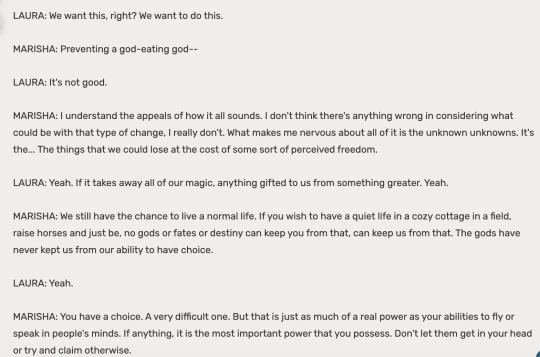
laudna is speaking to a possible future here. but in her words she's also saying that she understands that that future might mean abandoning what they feel called to do by the gods. in this moment, she's not guaranteeing a future, she's explaining to imogen that they have a choice.
and as of now, episode 82, arrived on the moon, they've made that choice. they're orpheus. they've descended into hell, and they can't look back if they want to make it out.
it's important to note that laudna wasn't lying way back in heartmoor when she was talking to orym. the worst thing that could ever happen to her had already happened. but she was operating then on her very human understanding of the world.
since then, she's died (again), been resurrected, seen magic beyond comprehension, and surrendered herself over to the spirit of her murderer that lives in her head.
there are no rules anymore. and laudna has learned that there is always something worse.
the quiet life she talked about with imogen might have been taken from her forever. the narrative has grown teeth and it has sunk them into both her and the woman she loves.
"what does laudna have to look forward to, she's dead"
she's orpheus, yeah? we know how this story ends. her love's been called to the hell planet by fate. she won't get out without losing something.
maybe—maybe—there's still hope for that cottage together somewhere. i don't mean to rule it out entirely. but i think that laudna herself, the character, has lost all belief in that possibility at this point. and that presents such a foil to the laudna that we met in episode 1.
sometimes the tragedy comes built-in.
even if. even when.

(all quotes pulled from critical role wiki's transcripts page)
#critical role#imodna#imogen temult#campaign 3#laudna#imogen x laudna#bells hells#laura bailey#marisha ray#liam o'brien#critical role spoilers#4sd#4 sided dive#4sd spoilers#four sided dive#orym of the air ashari#cr orym#jackie holds gently#jackie loves the lesbian witches#southern gothic#southerngothic
127 notes
·
View notes
Text
Nesta Vs ACOSF, a rambling rant
TW: mentions of sexual assault and abuse
Besides the "love" story that read like a quiet descent into domestic horror, ACOSF has one element that keeps me from being able to pick it up even just to sift through for Nesta gems: sex.
Here me out, I'm not a prude and I think we could have gotten a smutty romance but...
At her core, Nesta has always been a proud and modest person.
To be clear, with pride, I mean that her sense of self - her famous steel spine - has kept her together and unbroken even during harrowing circumstances. It's vital to her. It's so ingrained in her that - given we have no other explanation - we can assume it's what shields her mind from literal magic. However, like any trait, her pride can also be a thing that comes off as negative in the wrong situations.
With modesty, she was raised to keep a certain ideology that based her value on sex, beauty, marriage etc but it's important to understand that Nesta applied those standards inwards, at herself. (Eg In acotar, she brings up Feyre and Isaac in defence of her and Tomas, in acomaf, she is mostly upset about not hearing from Feyre or being notified that Feyre has switched courts - not about Feyre sleeping with Tamlin and then Rhys)
Now, I don't think Nesta's modesty makes her better than Feyre, in fact I was happy to get the representation of two different types of views on sex
But what I didn't consider at the time was that SJM was painting this out to be a negative trait.
In retrospect it seems obvious even though Nesta has defied her narrative destiny and become a sort of icon, at the end of the day she was still supposed to be written in a negative contrast to Feyre.
It seems funny but imagine you consumed the book the way Sarah intended, the way so many in the fandom have. The old Sarah Says rule, for my long time mutuals.
For example:
The dinner in acomaf - it's obvious Nesta is upset that she hasn't heard from Feyre only to have her come through not only as a whole Fae but bringing others and endangering their entire family.
But imagine it as a one dimensional reading and suddenly the "I fuck" dialogue is a girlboss moment of feminism giving a fuck you to the strict patriarchy of the "mortal lands" let's ignore how the Fae are actually more patriarchal and the Illyrians even more so than that
So understand that Nesta's modesty is being directly contrasted with Feyre's sexual freedom. The reader - at least from sjm's perspective - is supposed to agree with Feyre and disagree with Nesta in a sort of win/lose, yes/no, black/white dichotomy.
And because sjm is consistent and boring and a self-inset author, this dynamic doesn't change even when the protagonist does.
Only now sjm and her feminism has changed from fuck-whoever-I-want girlboss to kinky-but-only-with-my-husband tradwife
So Nesta can't be prudish and cut off because 1) it's not as conducive to the breakdown of self and buildup of a dependent and abusive relationship and 2) it's not in direct contrast with Feyre's current monogamous, traditional family values character.
So Nesta starts drinking and sleeping around and it's not because we're going to explore the unraveling of the pride and modesty at the core of the character as part of her transformation or as a result of her trauma
But because it's supposed to be a bad look, degrading, it shows she's failed, it makes her a loser
All of that is already insane. And even more so when taken with the context of her assault by Tomas and the sex centred relationship she has with Cassian
Now add to that the fact that in the book, Nesta is an object of desire for 2 villains and undergoes assault and drowning AGAIN
Sjm literally gives less than 2 fucks about SA, that much is obvious even from the way she inflicts and then disregards the experience of both Feyre and Rhysand respectively. It's a tool for her, a quirky story element
But to have Nesta experience such a similar thing - especially when the experience of being Made can be read as a sort of rape allegory on its own - and all for the sake of "romance" fantasy??
Even Nesta's reading habits are sexualised, to be clear I don't think there's anything wrong with reading smut, but the scope of her intellect and reading is narrowed down when we're suddenly made to believe most of the books she reads are smut.
This is someone who likely taught herself economics and investment within months in order to not just pay off the debt, upgrade her whole family's way of life but also rebuild the family fortune. Someone who, having stopped schooling at around 14/15, did the math needed to calculate the feasibility of the evacuation of a small country.
Someone who's verbally stated life goal was to see what a woman could make of herself in the world.
Even her love of reading is used as a stepping stone for how horny she is, instead of it being a result of her deeply ingrained need for escapism
She reads smut because the only thing she has in common with Cassian and the IC is sex. Because sjm thought one of the core elements of a friendship between 2 SA survivors and a disabled woman from a culture that mutilated her for being born a woman would be their desire to fantasise about men.
All the while the male love interest treats her like garbage.
We could have had a smutty book filled with sex where each scene could have been the growth of Nesta's trust and love of Cassian through intimacy. It could have been a sexual relationship that involved and explored kink - which explored vulnerability and the negative impact of how Nesta's pride became a source of stress and strain.
It could have been an exploration about the complicated relationship with desire and oppressors that many survivors have. But it isn't.
It's hahaha horny, so RELATABLE
Even when it comes to the abusive situation Nesta grew up in, it's just hung up like decoration on the character. Not explored, let alone healed. I don't wanna hear that sjm explained or explored Nesta's abuse when we don't even get her mother or her grandmother's names
We don't get
The complexity of being a trapped and abused woman who came from a trapped and abused woman who came from a trapped and abused woman
Or the complexity of a dysfunctional family
Or even the journey of recovery from addiction and self-harming behaviour
Now, not every aspect of Nesta or any survivors lives have to boil down to how it relates to their experiences but SJM is praised for her "recovery" and so much of this book is about sex and abuse but has no depth
It could have been a less-deep, fun experience of sex and desire and kink. But no
Nesta has sex with many faceless men because sjm is condemning her as a failure. Sex is her punishment, it makes her dirty and unworthy and cheap.
Then, through her "healing", she becomes a sex doll for the right guy. Sex is her reward, it makes her hot and useful and appealing.
Sjm writes not just like a man but like a particularly talented misogynist so it's the way sex is used that really puts me off
Edit: ultimately I think the sex and romance should have interacted with and evolved her pride, modesty and past experiences, rather than those things being demolished to turn her into a sex doll
463 notes
·
View notes
Text
"You shouldn't criticise/analyse SJM's characters/worldbuilding because it just isn't that deep." Is a take I see a lot when someone analyses or criticises SJM, and while I get where you're coming from, I do have a couple of issues with this take.
First of all, it's important to be able to criticise all media, even your your favourites, no matter how good or bad they are. Media of all formats is a product of it's time and goes a long way into helping us learn about the sociopolitical climate of the time it was written, from the past, present or future. As a result, no piece of media can be considered 'perfect' or without points to criticise, and analysing it can give us perspective on issues we may not even realise exist. This is true for most, if not all media, from books to news channels to music or tv shows.
If you don't want to analyse or criticise it though, that's fine. Just ignore posts and videos of people who do, since there's no use in telling them that they're wasting their time. Some people enjoy criticising/analysing the media they consume, but if you don't, then just let them be.
Now, here's the bigger issue I have with this take. It might really not be that deep to you, but it might really be that deep for other people. Especially since SJM books have a pretty young fanbase. The books are YA, and are advertised as being for ages 12 and up.

Many kids, young girls mostly, that read, even just the first book, are shown Feyre forgiving Rhys at the end of the book after SA-ing her for three months or Feyre getting back with Tamlin after he watched her get tortured for three months, and romanticise it. Then there's the second book, where she ends up with Rhysand despite what he did, and even lets him do it again at the CON.
Nesta is pressured by Elain and Feyre to let her use their home for something incredibly dangerous despite her very reasonable concerns, only to then be insulted by Feyre's friends for a situation he wasn't even there for, only for some romance to between them to be hinted at. In Acowar she's further pressured by her sister, and strangers who hate her, to put her healing and coping from her trauma aside to push her clear boundaries to help her sister even more despite her and her friends not having a great track record of holding up their ends of deals from Nesta's experience.
And don't even get me started on the train wreck that was ACOFAS- ACOSF. If these actions and behaviours were acknowledged as being toxic or wrong, that would be fine, somewhat. However, the narrative paints these characters and behaviour in a positive light, despite the fact they aren't. For young readers to look at this, and to idolise these characters and their behaviours, thinking that it's what they want in a partner, is disturbing.
It's fine to not want to critique or thoroughly analyse a book, but discrediting people who do, especially if they're pointing out harmful behaviour being perpetuated in said books, is not. Ignoring the harmful behaviour these books perpetuate is making you a part of the problem, and I truly hope that your view on this behaviour would change if it was coming from a living person instead of a fictional one. Be it towards you or somebody you know.
#sjm critical#acotar critical#acomaf critical#acowar critical#acofas critical#acosf critical#inner circle critical#nesta deserves better#anti rhys#anti inner circle#anti rhysand#pro nesta#anti acosf#anti amren#anti mor
81 notes
·
View notes
Text
I can't stop thinking about Khem and his relationship to sex as power and where it lies in relation to his own experience of sexuality. I also can't stop writing rambly, unstructured nonsense.
As we know, there's no explicit indication as to how Khem identifies sexuality-wise, other than subtle hints that Chatra's positive attention pleases him somehow (the repeating of 'you did a good job today', the very slight smile and perplexed pause at Chatra's admission that he just wanted to spend time with him, and finally, his frankly reckless trust in Chatra in the tree). And of course, 19th century understanding of 'sexual identity' as a character trait was different from the present.
I would have been interested in seeing more of Khem's perspective of his own sexual identity, considering that there was a scene that addressed homophobia directly. The fight that broke out was essentially used as a plot device to get him alone with Chatra, so I'm intrigued as to why they chose to emphasise homophobic rhetoric, when it seems that it isn't really presented as the issue. In Khem's case, class always trumps everything else.
All instances of Khem's sexuality we see are completely predicated on exploitation, with no suggestion at all as to what Khem's experience is beyond that. He has sympathy for the courtesans, because he understands what it is like to be reduced to the value of the pleasure to be derived from one's body. The first encounter with Phraya Wichiendej and the Inao performance, combined with the opening scene of the film, establish (to me at least) that he is practiced at recognising men's desire to 'have' him in a sexual sense, but perhaps more importantly, to exact class-facilitated power over him (he isn't really in a position to refuse). The way he smiles up at Wichiendej upon greeting him, the tone of voice he uses, come off as deliberately deferential in a way he has learned strokes the egos of men who see him as lesser. He recognises that it is the only tool for security or potential advancement he has in that particular kind of social situation. Tragically, the delivery of his lines during their meeting also holds a sliver of tenacious hope for the compliments to really only be for his efforts and not a veiled assertion of dominance ("you please me and I have all the power I need to make you do what I want"). And who knows, this may well have been the case, as we aren't shown Wichiendej pursuing Khem in any way after the Inao performance. We get the flashback montage of Khem's history of being sexually exploited by what appear to be men and a woman. So, again, the sex part of this exploitation is primarily about power, to reaally drive home that Khem has never had agency over his body or in his life. It is his base trauma.
The fight is Khem being slut shamed to compound on the humiliation he already feels from having received a thorough and public dressing down from Kru Phikun. And to add insult to injury, not only is he a slut, he's potentially 'a gay slut' (D.E.B.S? anyone?). He's understandably frustrated and angry, because he has had no choice in the matter, like, ever. What we don't know, is how he feels about the accusation regarding the gay part.
We don't get to see him as a sexual being on his own terms, he doesn't do any explicit desiring at any point in the narrative. So, the question is, how are we to interpret Khem's reaction to the disparaging of sexual conduct between men specifically? That's a big part of the argument, even to the point of surpassing the accusation that he is performing sexual favours in general. In fact, his assailant makes sure to let him know that he thinks performing gay sex acts for profit is worse than being a female sex worker in man suang, because gayness is particularly disgusting. Khem demands to know who presented the claim and whether they have proof, and he does it in a defensive, aggressive manner, and understandably so. Rather than commenting on the gay part of the accusation further than denying it, he chooses to openly defend the courtesans, effectively aligning himself with them, negating any discussion of the gender specificity of the accusation, but implicitly confirming the sexual favours part.
Does he recognise himself as experiencing desire for men? Or anyone, for that matter? Can he, when the primary association he is shown to have with sex is power-driven transactionality, instead of pleasure? Clearly this has been going on for a long time, but how long exactly? How has this impacted his perspective on sex and sexuality?
I was actually quite surprised how much time they devoted to establishing this part of Khem's character, without it playing a more pivotal role in the plot as the story advanced. I was sure at the Inao performance that Wichiendej would be built up as some kind of lech whose downfall would lie in his classist underestimation of Khem as a person, clouded as he would have been, with lust and a sense of superiority.
That leaves it to be simply a building block of Khem's character background, with the purpose to elicit sympathy in the viewer and contribute to world-building. But how does he feel? What does he think??
I know that Apo mentioned in an interview that Khem is some flavour of alphabet soup (not sure how specific he was tho), but within the narrative, they leave us guessing on multiple levels.
My fanfic fantasy for this whole thing is Khem finally being given a chance to get to know himself and have agency in choosing what he wants. Emancipate the lad!!!
98 notes
·
View notes